#richard t. greener
Text
The Dead Poets' favourite season:
[that's my personal opinion about which season the dead poets prefer, not what season they are (it's a different concept). sometimes the two could coincide, not always.]
neil perry: spring
he loves mid-season, spring is a symbol of renaissance. he likes to see trees filling with leaves, and fields full of flowers. he likes to be outside without it getting too cold.
todd anderson: winter
it's COLD, he loves cold. he can use sweaters and stay under the covers. he likes to get out and see the puff coming out of his mouth because of the cold. he loves snow, which reminds him of the snow battles with his brother when they were young.
charlie dalton: summer
he likes to go to the sea in the heat and be able to refresh himself in the water. he can put on t-shirts and shorts, and he can let his hair dry in the sun. after dark, the heat drop and there is a refreshing breeze, but he can still stand without sweatshirt.
steven meeks: autumn
he loves tea, first chills, to stand outside without freezing to death. it starts raining more often, it relaxes him, he likes the pattering and dancing in the rain.
gerard pitts: spring
he is an animal lover and he likes to hear birds chirping. everything is greener and colorful. he, at home, has a cherry tree and loves to sit down there, he likes to see the changing seasons through him and loves the time when he begins to bloom.
richard cameron: winter
everything is calm and quiet. he likes to feel his face burning because of the freezing wind. he loves to wear hats, gloves and scarves.
knox overstreet: autumn and spring
he doesn’t make many differences, but prefers the middle seasons, not too hot or too cold. he can take peaceful walks or cycling.
I don't care about canon, I don't want to suffer, so I wrote several things I imagine :)
let me know what you think (if you want, ofc)
#dead poets society#dead poets aesthetic#dps#dps fandom#dead poets honor#dps boys#dead poets society hcs#dead poets society headcanons#dps headcanons#poets' favourite season#charlie dalton#neil perry#todd anderson#steven meeks#knox overstreet#richard cameron#gerard pitts
61 notes
·
View notes
Text

Officially* considered to be the first Black woman to earn a B.A., Mary Jane Patterson was born enslaved in Raleigh, North Carolina sometime in 1840, though there are few subsequent details of exactly how she and her family eventually found their way to the free state of Ohio. Enrolling at Oberlin in 1857, she disdained the then-standard 2-year program for women and instead enrolled in a full 4-year program of classical studies --the "gentlemen's course." She formally attained her Bachelor's (with high honors) in 1862.
Patterson then became a teacher; first at a local school in Ohio and then moving to Philadelphia to teach at the Institute for Colored Youth. Five years later she again moved, this time to Washington, D.C., to join the faculty at the then-new Preparatory High School for Colored Youth --the first-ever public high school for Black students (and the first public high school in D.C.; today known as Paul Laurence Dunbar High School, on M Street). In 1871 Patterson was elevated to principal, but briefly stepped down to the role assistant principal for one year under Richard T. Greener (himself the first-ever Black Harvard graduate and certainly a subject of a future lesson in this series). A year later after Greener's departure, she re-assumed the principalship and stayed in that role until 1884.
Patterson made good use of her prestigious position and advocated for civil rights and women's rights --significantly she founded the Colored Women's League of Washington, D.C. She died at the relatively young age of 54, in 1894. Her home at 1532 15th St., N.W. remains, part of D.C.'s African American Heritage Trail (PDF brochure).
( * - While Patterson's fellow Oberlin alum Lucy Stanton Day Sessions is considered to be the first Black woman to graduate from a college in the U.S., Sessions' studies were in a Literary Course program that, while equivalent to a Bachelor's, could not at the time be considered a degree.)
#blm#black lives matter#womens history month#oberlin#mary jane patterson#richard greener#teachtruth#dothework#showup
4 notes
·
View notes
Text
Office Hours, Part 14

Summary: Lorelei Browning has just secured a job as an assistant professor at Exeter College in Oxford. Naturally, she is eager to prove herself and meet every challenge sent her way, but what she does not expect is the tall, handsome stranger who will quickly become much more than a colleague…
Relationship: Richard Armitage x OC (Professor AU)
Word Count: 1.9k
Rating: T (some chapters E)
Warnings: This chapter deals with heartbreak, please proceed carefully.
Read on AO3
I have always loved rain. There is something magical about the way it soaks the city like paint on a canvas. The grass is greener, the cobblestone streets glossy, and the sandstone buildings darken like biscuits dipped in tea. But today, everything feels gray.
I have barely slept since Saturday, and the pile of unmarked essays and exams on my desk seems to grow by the second, but I find it impossible to concentrate on anything. I was so looking forward to the end of the term to be able to spend more time with Richard, but now hours and days blend into one endless stretch of gloom.
I miss him. I miss him so much that even taking a steady breath hurts. It’s only been two days, but they have been the longest and most unbearable two days of my life. Richard turned my whole world around so suddenly and unexpectedly, and I grew to rely on his reassuring presence more than I dare to admit. Without him, my life feels cold and empty.
I forgot my scarf at my flat this morning, then walked straight into a puddle when I crossed the street, and my socks are still soggy in my loafers. If that wasn’t enough, I was already setting up things for my first lecture when I realized I had forgotten my notes at home. Even my students noticed how disordered I am, and though I tried to laugh it off with them, the unyielding ache in my heart only grew heavier.
It’s just my terrible luck that we have a meeting this morning—the last one of the term—and when I walk into the room, the only remaining spot is right next to Richard. Of course. For a moment, I stand frozen in the doorway, my throat tightening. I wasn’t prepared to see him so soon. He’s wearing the cream-coloured jumper he wore that night at the pub when we shared our first kiss; I have to blink and bite my lips to stop myself from weeping at the memory. I miss his kisses and the way he would cradle my head in his large hands as his lips caressed mine. I miss the way he would bury one hand into my hair when his tongue slipped inside my mouth and the way his warmth would seep into my skin when he pressed me against him. I miss everything about him.
When I take my seat next to him, he looks up at me, and despite everything, my heart flutters wildly in my chest. I can tell he hasn’t slept much either; his eyelids are heavy, dark circles cover the skin below his eyes, and his hair is a mess. I’m suddenly filled with a desire to brush away the stray lock hanging over his forehead and caress away all the tangles atop his head, as I have done so many times before, but I can’t.
No words are spoken between us in the few minutes before the meeting starts, even though there is so much I want to say to him. I want to apologize for hurting him and being so terrible at loving him. Yet I also want to tell him just how much I love him and how we deserve another chance, but even if we were alone and away from the college, I wouldn’t be able to find the words. And worst of all, I know nothing I can say will give him what he wants. What he needs. So instead, I merely steal another glance at him, my guilt and longing clogging my throat.
He is writing something in his notebook in that clean, rounded handwriting of his, and I find myself following the movements of his large, gentle hand with his ink-stained thumb. He is probably writing something inconsequential, like a to-do list or something he wants to bring up during the meeting and fears he might forget. And still, I so desperately want to know what he is writing. Some people say that an image is worth a thousand words, but I disagree. Words are magic, offering us a window into a person’s very soul, and right now, I would do anything to be privy to Richard’s thoughts and feelings once more.
I’m not sure if I’m relieved or disappointed when the meeting ends and I have to leave Richard. I probably won’t see him until next term in January, and the thought of being without him— the man I love—for so long, makes me feel incredibly lonely. When I lock myself in my office, I can’t hold back my tears, which stream down my cheeks and fall upon the leather tome in my hands, staining its ancient, cracked surface.
The first time I met Richard was in this very room. I remember it as though it were only yesterday. I couldn’t have foreseen how much he would grow to mean to me, but already at that first moment, I knew there was something special about him, and we immediately got along so well. He always made me feel so comfortable, so safe, even when I feared his presence in my life would turn everything upside down.
“There’s a thousand reasons why this wouldn’t work!” I exclaim, gesturing to the two of us with my free hand. His grip on my other wrist tightens, but I try to ignore it. “I have to focus on my career. I have to focus on my classes and my research—I have 2 conferences to get ready for and my book to finish,” I begin in a breathless and agitated voice. “And, alright, let’s say we give this a try—what happens when it doesn’t work anymore? It’ll make everything so awkward and unpleasant between us. And who’s to say that given the opportunity you wouldn’t speak against me and try to convince others that I’m not a good fit for the college?”
“I would never do that,” he replied immediately, shaking his head. Lines appear on his forehead as he continues to frown, and a sudden urge to trace my fingers over them to try and soothe him washes over me. “And who’s to say this would end?”
“Richard … we don’t even know each other, really,” I shrug, biting my lips against the overflow of affection his words stir in me.
“We have plenty of time to do that,” he says, his eyes softening as he takes another step toward me. I only need to lift my hand an inch or two, and I’d be able to touch him and smooth out the lapel of his tweed jacket.
I want to believe him so much; my whole body aches to throw itself into his arms, but I know, despite the softness and honesty shining in his blue eyes, that my concerns are sensible. “You’re not even trying to fight this!”
“Why would I?” he says, his voice remaining calm and steady even though a battle rages in his eyes. “Maybe I’m a fool for saying this and believing it as strongly as I do—God knows I haven’t felt like this since I was a teenager—but I can’t stop thinking about you. You’re just so beautiful, and I don’t mean your outward appearance—although only a fool wouldn’t notice how gorgeous you are. But I'm talking about your curiosity, your intellect, and compassion and generosity . . . every part of you I have been fortunate enough to learn about is beautiful, Lorelei.”
The familiar sound of my ringtone disturbs the memory, and I take a few deep breaths to try to regain control of myself when I see mum’s name on the screen.
“Hi, mum.” I answer the phone as calmly as I can, hoping I don’t sound as awful as I do.
“Hello, darling, how are you?” she greets me cheerfully, and her voice comforts me.
“I’m alright—last day of classes today,” I reply. “What about you?”
“Fantastic! I’ve started preparing for Christmas dinner. That’s why I called you actually—will you make your trifle again this year?”
“Sure, I’d love to!” I say, even though I have never felt less excited for Christmas.
“Great!” she exclaims, and I can almost hear her smile. Then there’s a pause, and I feel her hesitating before she says, “Listen, I know things did not go so well last Saturday but Richard is more than welcome to join us for Christmas.”
I gulp, trying to dislodge the knot lodged in my throat. “Oh, er … he—he won’t be able to make it. He has his own family dinner on the 25th.”
I should tell her the truth. She’s my mum; she would know how to comfort me. But at the same time, the memory of Saturday dinner is still fresh in my mind, and I fear that she might not understand the depth of my pain, or would try to convince me that the breakup is a good thing.
“Oh, alright,” mum replies after a short moment, sounding disappointed. “Just—just let him know that he is welcome anytime, alright? I’m sorry for how I reacted and for what your father said.”
“Yeah. Whatever,” I shrug, pressing my lips together .
“No, it’s not “whatever,” Lorelei,” mum hastens to say. “I truly feel awful. And yes, I am worried about the possible consequences of this relationship on your career, but really, I just want you to be happy. And if you say Richard makes you happy, then that’s all that matters.”
More tears spill from my eyes, and I bite my lips to swallow back my sob. “Yeah. He makes me happy.”
He made me happy.
“I really am glad to hear that,” she replies. “I’ll let you get back to work now. But don’t be a stranger, alright? Call us anytime you want.”
“I will.”
“And do pass along my apology to Richard.”
“Sure—I will.”
Not that my parents’ apology means anything anymore, I think morosely to myself as I sink in my chair after hanging up. I have to focus on the essays and exams I need to correct, but an old paperback resting on the corner of my desk steals my attention. I frown. I recognize the book immediately. Richard’s copy of Marlowe’s Hero and Leander. But I don’t understand how it got here.
With an unsteady hand, I reach out to hold it, then notice that a note has been inserted between two of its pages, right where the poem that was later titled Who Ever Loved That Loved Not at First Sight? begins. I carefully open the note, then shut my eyes tightly as I read my name in his handwriting.
Lorelei,
I’ve been rereading this poem, and I immediately thought of you when reading this part.
The message is followed by a little doodled heart, and I follow the slightly crooked line with my index finger. That is as close as I can now get to holding his hand. He must have left this here on Friday, when we were still together and still had a few kisses to share.
Oh, Richard.
Richard. Richard. Richard.
I’m so sorry.
A few hours later, I step out into the corridor, his book in my hands. Thankfully, Richard’s office door is open and he is nowhere to be seen, so I sneak inside and carefully place his book on his desk where he will see it. But the note, I keep for myself, and I hold it tight in my hands, even though I already know it by heart.
—
Taglist: @lathalea @linasofia @mcchiberry @fizzyxcustard @bitter-sweet-farmgirl @i-did-not-mean-to @xxbyimm @middleearthpixie @myselfandfantasy @notlostgnome @laurfilijames @swoopswishsward @quiall321
Let me know if you’d like to be tagged in future chapters or added to my taglist!💙
#richard armitage#richard armitage x oc#richard armitage x reader#richard armitage x you#richard armitage fanfic#professor au#office hours
18 notes
·
View notes
Photo
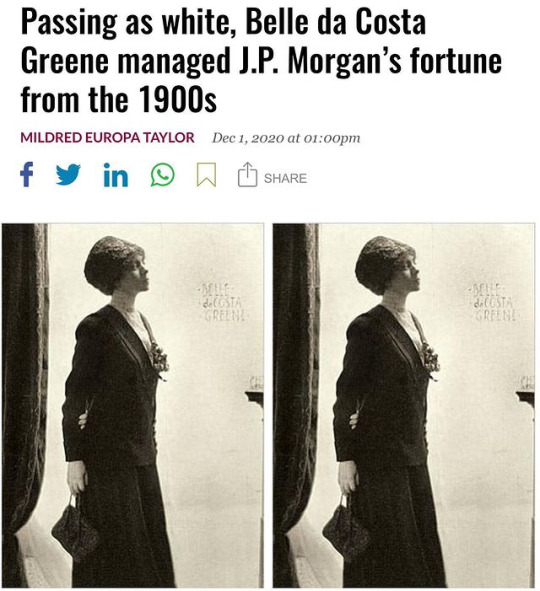
For 43 years, Belle da Costa Greene ran the Morgan Library — 19 years as the private librarian of financier J. Pierpont Morgan and later his son, Jack, then 24 years as the inaugural director of the Pierpont Morgan Library, which is now known as the Morgan Library & Museum.
She did not only help Morgan to organize his legendary collection of manuscripts and rare books, but also transformed Morgan’s private collection into a major public resource which, to date, hosts series of lectures, exhibitions, publications, and research services, all of which first started under Greene.
Becoming “arguably the most powerful woman in the New York art and book world” at the turn of the 20th century, Greene, with a flamboyant fashion sense, dined with the rich and famous, including opera stars, tycoons, and royalty. She had access to places that were not welcome to Black people, and she won many admirers who were charmed by her acuity and intelligence.
But historians say she probably wouldn’t have made it to that level had she revealed her background. Greene told everyone who bothered to ask that she was Portuguese, but in fact, she was Black. Her employers did not even learn of her secret until her death.
The child of two African-American parents of mixed ancestry, her birth certificate identified her as “colored” though she was light-skinned as both her parents. Her father was lawyer Richard T. Greener, the first African American to graduate from Harvard and the first librarian of color at the University of South Carolina. Genevieve Fleet was her mother.
Growing up in a community of color in Washington, D.C., Greene, by the age of 12, wanted to work with rare books. “I loved them even then, the sight of them, the wonderful feel of them, the romance and the thrill of them,” she once said. Though Greene perhaps developed her love for rare books from her father, she knew that it would be difficult for her to rise, being in a deeply segregated and racist society and having witnessed her father being subjected to discrimination.
So when her father left the country in 1898 for a consular post in Vladivostok, Russia, and her parents’ marriage came to an end, Greene and her mother shortened their last name. They began publicly describing themselves as Americans of Portuguese descent and passed as white.
Greene (named Belle Marion Greener at birth) became Bella da Costa Greene, constantly explaining that “da Costa” was a reflection of her Portuguese ancestry.
While in her teens, Greene, unable to afford college without her father’s help, started working at the Princeton University library where she soon mastered cataloging and served in the reference department. However, it was her interest in the library’s rare-book collection that grabbed the attention of Junius Spencer Morgan, a nephew of J. Pierpont Morgan. Junius recommended Greene to his uncle, Morgan, who was then building a library in New York City for his large collection of manuscripts and early books.
By late 1905, Greene had begun working as the private librarian of Morgan. Managing, documenting and building his collection of rare books and manuscripts, she also organized public exhibitions at outside venues and traveled regularly to Europe to purchase additions to the financier’s collection. Morgan admired her work and soon made her his “primary adviser on manuscript matters,” according to a report by The New York Times. By 1911, Greene had become a well-known figure to dealers and scholars, and could even defeat experienced bidders during auctions. By 1912, she was earning a quarter million a year.
When Morgan died in 1913, it was found that nearly half of his $3 billion was in his art collection. “Some went to the Met but the rest remained under the control of Belle da Costa Greene,” a report noted. It is also documented that Morgan’s “considerable fortune” was at her disposal. Greene continued to work as a private librarian to Morgan’s son, J.P. Morgan Jr. It was during this period that Greene thought of making the rare books in her employer’s collection available to the public instead of getting them locked in the vaults of private collectors.
Thus, in 1924 when Morgan’s library became a public institution and she became its first director, she mounted a series of exhibitions, and one even drew a record 170,000 people. She continued to make trips to Europe and would for the next 24 years transform her boss’ library into a world center for scholarly research.
In 1949 — a year after she retired — an exhibition was mounted at the library in her honor. She died the following year but her legacy lives on in the many contributions she made to bibliography and scholarship. Her employer’s library was renovated in 2006. The Morgan Library & Museum to date caters to scholars while playing its role as a public institution.
[h/t]
#passing for white#black women#belle da costa greene#morgan library#j. pierpont morgan#j.p. morgan chase#jp morgan chase#pierpont morgan library#morgan library & museum#richard t. greener#richard t greener#genevieve fleet#belle marion greener#princeton university#junius spencer morgan
70 notes
·
View notes
Text

For sale: one early 80’s Craftsman riding lawn mower with an 11 horse power engine and 30″ mowing deck. Bottom line, this beast is a sick ride! In fact, I’d even say it’s the El Camino of yard whips. Just take a look at those sweet ass rims. So dope they look rented. #arethosedubs?
Wait, is that a chicken in the background? Damn straight! Because the Craftsman riding lawn mower was considered the barnyard pimp of its day. Get yer yerrd on, fool!
Is it fast? Ever heard of old school 3 on the tree? Well, this whip’s got 8 on the hip. That’s right, 8 screamin’ gears of merciless speed! Need to mow that $h!t Richard petty style? No problem. Snappin’ necks and mowin’ decks, homie…
Just look at this beast. It even has the original factory pin striping. This NASCAR style speed demon will look quick just sitting in your driveway. Neighbors be like “SMH with envy.” Don’t dare put this baby in the shed. She deserves the garage. #nooneputsbabyinthecorner
Does it run, you ask? HELLS YEAH! Like a pack of Kenyans on crystal meth! This bad boy just got a carburetor rebuild, new seals all the way around and a brand new battery installed. Turns over quicker than your prom date. And you don’t even need to buy it wine coolers.
Don’t get me started on the mowing deck! 30 full inches of precision slicin’ and dicin’. Cuts better than Edward Scissor Hands and Lorena Bobbit in a knife fight. And this blade runner has 8 cutting heights! Go full Brazilian with a 1 inch cut, or bring your field of dreams up to 8 inches, 1970’s style; your choice. All I’m sayin’ is this mo-fo fades a lawn better than a set of hair clippers at Fantastic Sams. Whaaaa?
But can I mow with it at night, you ask? Who hasn’t awoken at O’dark:30 to mow their lawn black ops style? No problem with this night rider. It has a fully functioning head light, Michael. #Getyerdarkon
Pretty sure this man-ride is the luxury model. It’s equipped with a plush pleather spring ride seat for those Brokeback yards, 10 inch Kung Fu grip steering wheel and rubberized foot pads. Ain’t no footloose goin’ on up in here. Safety first, homies!
You: So how much is this Kentucky bluegrass love machine?
Me: Just $500.°°.
You: Wait, what?
Me: That’s right, you heard me, only $500 greenbacks.
The world: How is that possible?
Me: my family and I have enjoyed using this cutting-deck of dope-ness since it’s immaculate inception back in the 80’s. Can you say one owner? Yup!
It’s time this black pearl set sail and find another crew to roll with. It’s faded many lawns in its day and is looking for the greener grass on your side of the fence.
Don’t wait to call or you’ll be tellin’ stories about the one that got away for the rest of your life, or call me now and become the lawn jockey you always dreamed to be.
No texts, please. I need to hear your voice and know that this family pet is going to a 100% full blooded american. #Merica

🤣😂🤣😂
196 notes
·
View notes
Text
My Favorite Films and Performances of 2020
“I wish I could’ve seen it on the big screen.”
It was a strange year, and even stranger year of movie watching. In 2020 I saw only one of my top films in a theater, which is crazy (like much else over these past months). But the experience of keeping up with the movies this year was a reminder that great filmmaking can transcend the specifics of the viewing experience. In your living room, in bed, projected onto the side of a garage, streaming on Twitch, broken up into multiple sittings, maybe even on your phone (desperate times)… if doesn’t matter as long as it connects with you. A great film has the power to soothe and transport, to alter your perspective, to re-wire your brain. So while I didn’t get on a single airplane last year, I definitely went places. And I’m grateful for these changes of scenery. For the time-travel as well; last year in my house, we found great comfort in revisiting a bunch of old favorites. It was also an opportunity to finally watch a number of those older films that had someone evaded us… a year of catching up, now or never. We were members of a weekly movie club for some months — that was cool. Another pleasant silver lining was the emergence of virtual film festivals, which have been a fantastic opportunity. I hope that they can continue in some form when this pandemic is in the rearview. Because, you know, getting to Park City is a real schlep. All this to say: like you, I’ll always remember 2020. In this truly crummy year, the movies really helped.
I’m including some of the film festival stuff that’s coming out a little later, because the boundaries between 2020 films and 2021 films feels blurry to me without proper theatrical releases.
TOP 5, loosely ranked. I love these deeply.
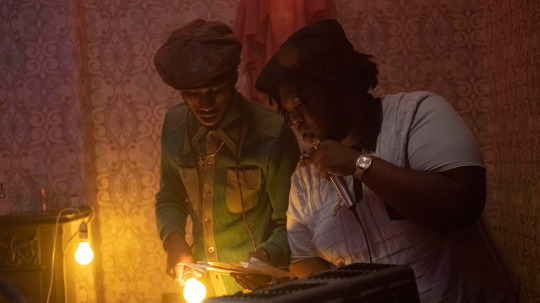
1. LOVERS ROCK, Steve McQueen
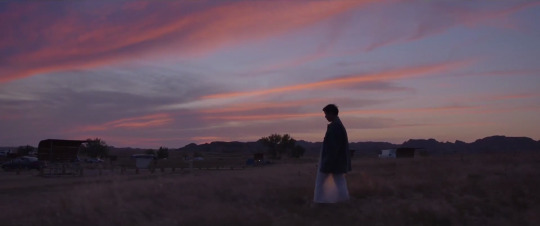
2. NOMADLAND, Chloe Zhao

3. ANOTHER ROUND, Thomas Vinterberg
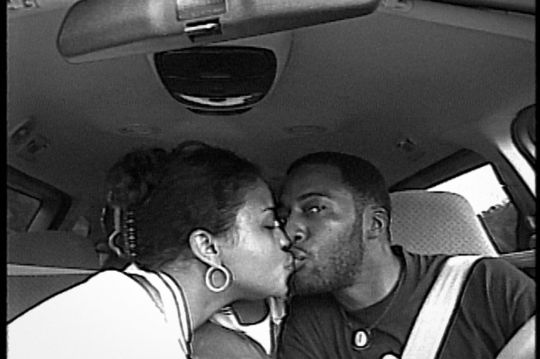
4. TIME, Garrett Bradley
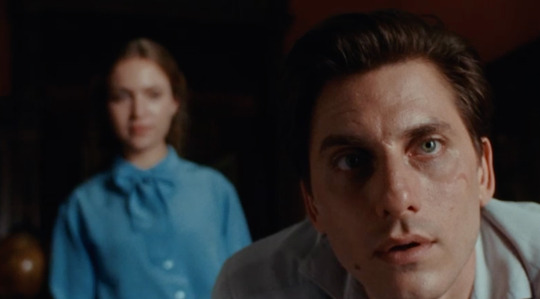
5. MARTIN EDEN, Pietro Marcello
--------------------
The rest of the Top 25, in alphabetical order. I loved these.
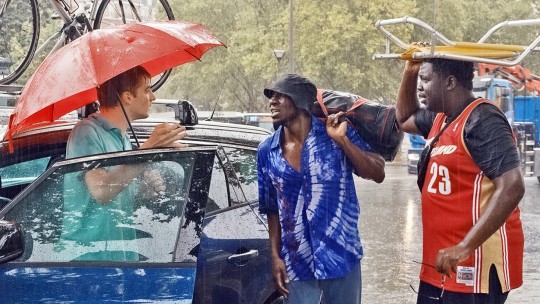
À L’ABORDAGE, Guillaume Brac
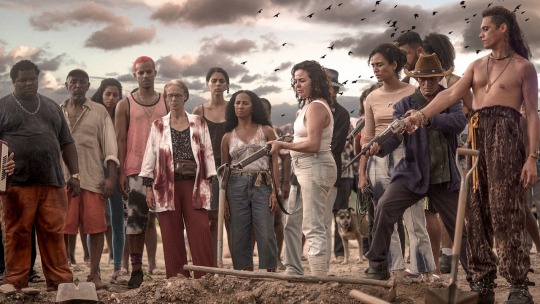
BACURAU, Kleber Mendonça Filho
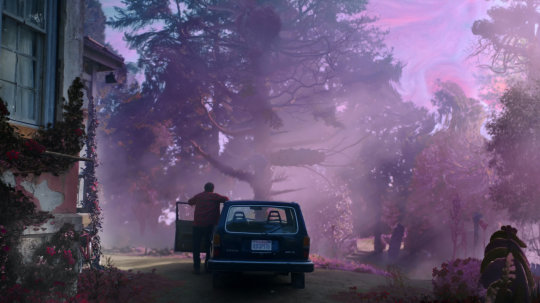
COLOR OUT OF SPACE, Richard Stanley
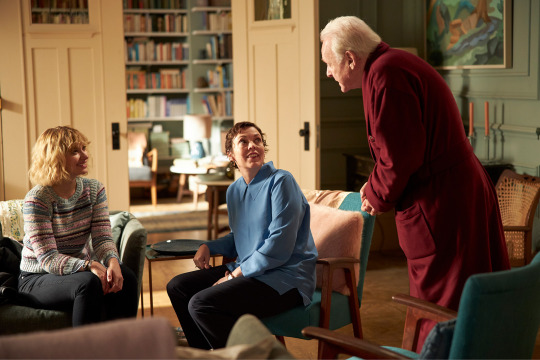
THE FATHER, Florian Zeller
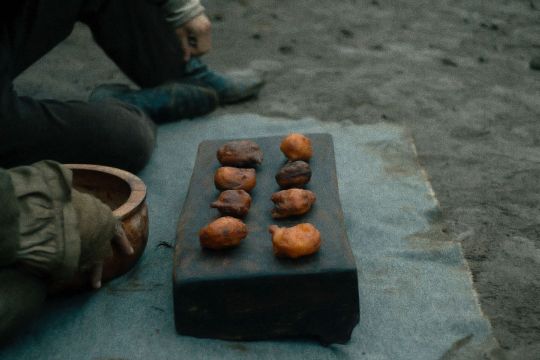
FIRST COW, Kelly Reichardt
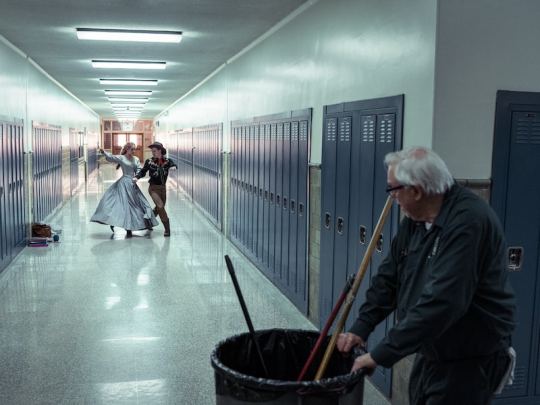
I’M THINKING OF ENDING THINGS, Charlie Kaufman
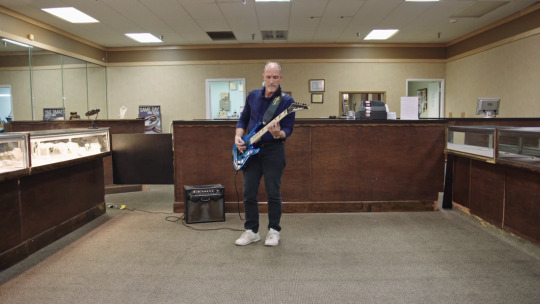
JASPER MALL, Bradford Thomason and Brett Whitcomb
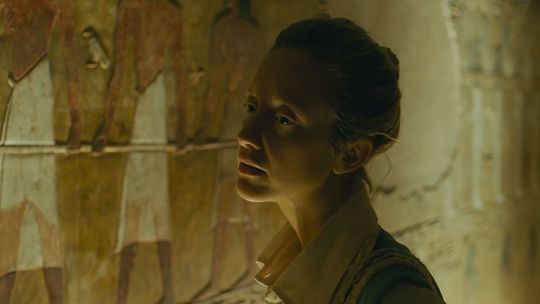
LUXOR, Zeina Durra
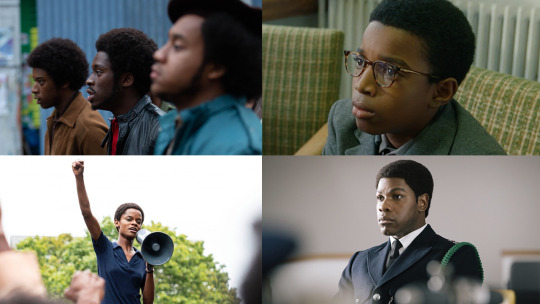
ALEX WHEATLE / EDUCATION / MANGROVE / RED, WHITE AND BLUE, Steve McQueen
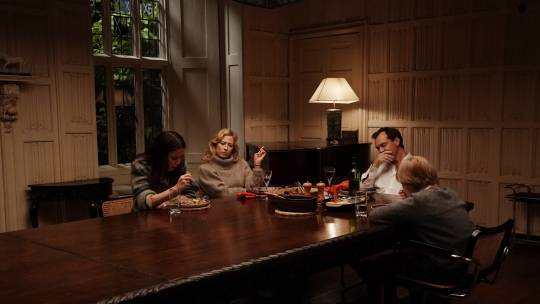
THE NEST, Sean Durkin
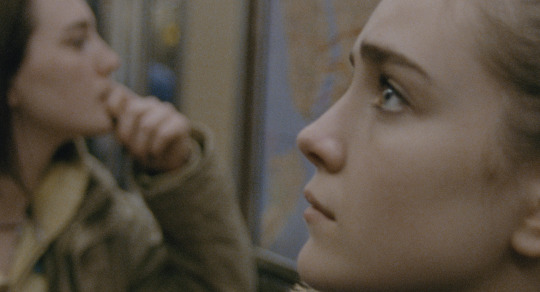
NEVER RARELY SOMETIMES ALWAYS, Eliza Hittman
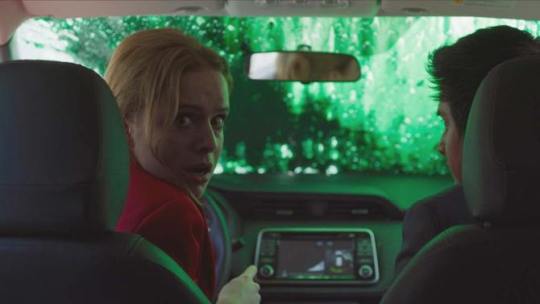
NEW ORDER, Michel Franco
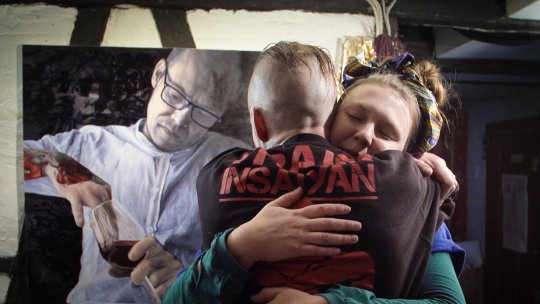
THE PAINTER & THE THIEF, Benjamin Ree
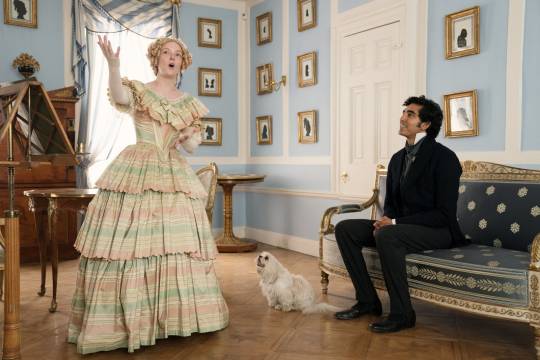
THE PERSONAL HISTORY OF DAVID COPPERFIELD, Armando Iannucci
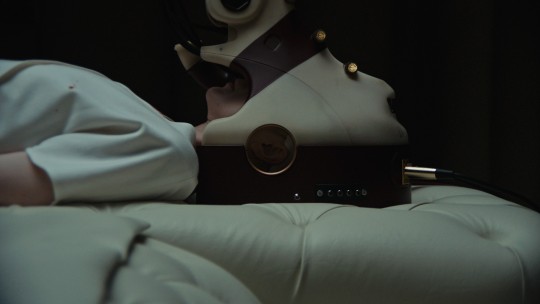
POSSESSOR, Brandon Cronenberg

PROMISING YOUNG WOMAN, Emerald Fennell
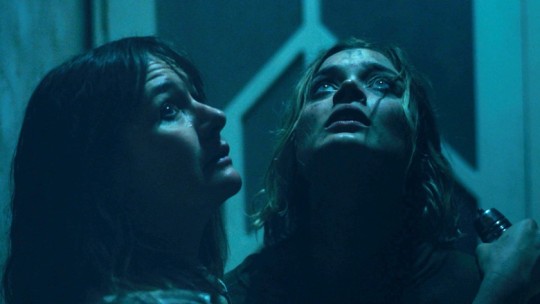
RELIC, Natalie Erika James

SAINT FRANCES, Alex Thompson
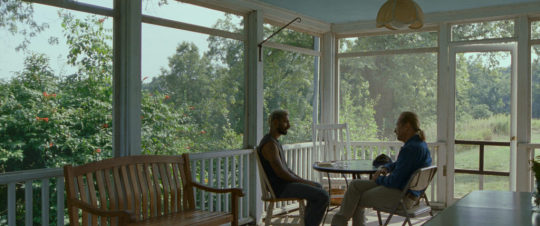
SOUND OF METAL, Darius Marder
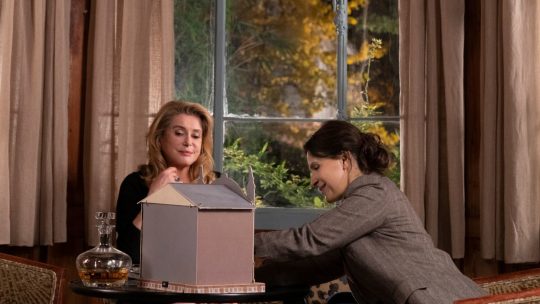
THE TRUTH, Hirokazu Koreeda
--------------------
I also enjoyed (some more than others):
Apples, The Assistant, Babyteeth, Bad Education, Black Bear, Blow the Man Down, Borat Subsequent Moviefilm, Butt Boy, The Climb, Da 5 Bloods, Deerskin, Emma, The Father (Bulgaria), Greed, His House, The Hunt, I Used to Go Here, I'm No Longer Here, Impetigore, The Intruder, The Invisible Man, Kajillionaire, La Llorona, Let Them All Talk, Lost Girls, The Man Who Sold His Skin, Mank, Never Gonna Snow Again, News of the World, One Night in Miami, Palm Springs, Preparations to Be Together for an Unknown Period of Time, Rebecca, She Dies Tomorrow, Shirley, Slow Machine, Sorry We Missed You, Soul, Spree, Straight Up, A Sun, Swallow, Tenet, Tesla, Tommaso, The Traitor, The Trip to Greece, True History of the Kelly Gang, Uncle Frank, Under the Open Sky, The Vast of Night, Vitalina Varela, Wendy, The Whistlers, Wildland, Young Ahmed
--------------------
And these documentaries!
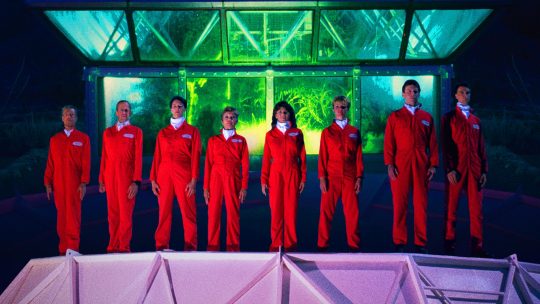
American Murder: The Family Next Door, The American Sector, Assassins, Beastie Boys Story, The Bee Gees: How Can You Mend a Broken Heart, Bloody Nose Empty Pockets, Boys State, Brainiac: Transmissions After Zero, Circus of Books, Class Action Park, Collective, Crip Camp, David Byrne's American Utopia, Dick Johnson is Dead, Fireball: Visitors From Darker Worlds, The Go-Go's, Gunda, Miss Americana, MLK/FBI, The Mole Agent, Mucho Mucho Amor: The Legend of Walter Mercado, My Psychedelic Love Story, Mystify: Michael Hutchence, Narrowsburg, On the Record, Other Music, Sisters with Transistors, Spaceship Earth, The Way I See It, Whirlybird
--------------------
And these shorts:
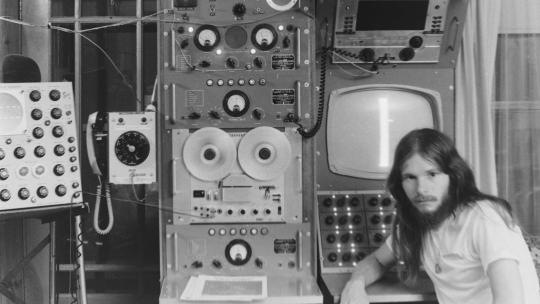
Bye Bye Body (which I edited), Fit Model, Friday Night Pizza for Daddy, Hard Cracked the Wind, The Human Voice, John Was Trying to Contact Aliens, Michael's Preference West, What Did Jack Do?, World of Tomorrow Episode Three: The Absent Destinations of David Prime
--------------------
My favorite performance of the year:
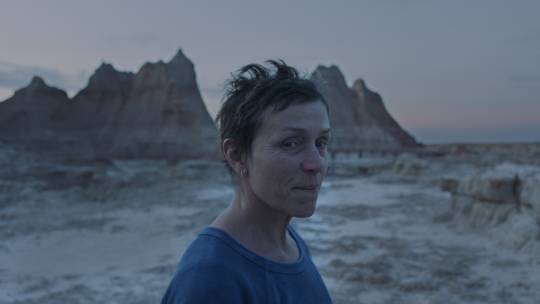
Frances McDormand as Fern in Nomadland
--------------------
Favorite ensembles:
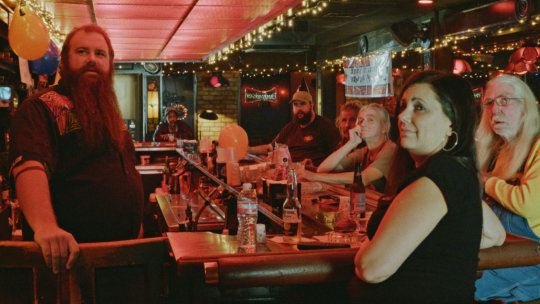
À l’abordage, Another Round, Bad Education, Babyteeth, Bloody Nose Empty Pockets, Blow the Man Down, Emma, First Cow, Kajillionaire, Let Them All Talk, Lovers Rock, Mangrove, Mank, One Night in Miami, The Personal History of David Copperfield, Promising Young Woman, True History of the Kelly Gang
--------------------
More memorable (and in some cases under-discussed) performances:
Christopher Abbott as Colin Tate in Possessor and as Gabe in Black Bear
Idir Ben Addi as Ahmed in Young Ahmed
Riz Ahmed as Ruben Stone in Sound of Metal
Daniel Algrant as Kelvin Kranz in Let Them All Talk
Maria Bakalova as Tutar Sagdiyev in Borat Subsequent Moviefilm
Haley Bennett as Hunter Conrad in Swallow
John Boyega as Leroy Logan in Red, White and Blue
Rob Brydon as Rob Brydon in The Trip to Greece
Jessie Buckley as Young Woman in I’m Thinking of Ending Things
Nicolas Cage as Nathan Gardner in Color Out of Space
Salif Cissé as Chérif in À L’abordage
Sheyi Cole as Alex Wheatle in Alex Wheatle
Cleopatra Coleman as Trina in The Argument
Carrie Coon as Allison O’Hara in The Nest
Michael Angelo Covino as Mike in The Climb
Willem Dafoe as Tommaso in Tommaso
Charles Dance as William Randolph Hearst in Mank
Catherine Deneuve as Fabienne Dangeville in The Truth
Katie Findlay as Rory in Straight Up
Sidney Flanigan as Autumn in Never Rarely Sometimes Always
Johnny Flynn as George Knightley in Emma
Julia Garner as Jane in The Assistant
Robbie Gee as Simeon in Alex Wheatle
Chris Giarmo as himself in David Byrne’s American Utopia
Betty Gilpin as Crystal Creasey in The Hunt
Ethan Hawke as Hank in The Truth
Kris Hitchen as Ricky Turner in Sorry We Missed You
Anthony Hopkins as Anthony in The Father
Jonathan Jules as Dennis Isaacs in Alex Wheatle
Sandra Guldberg Kampp as Ida in Wildland
Joe Keery as Kurt Knuckle in Spree
Udo Kier as Michael in Bacurau
Orion Lee as King Lu in First Cow
Delroy Lindo as Paul in Da 5 Bloods
Peter Macdissi as Walid "Wally" Nadeem in Uncle Frank
Matthew Macfadyen as Wilcock in The Assistant
George MacKay as Ned Kelly in True History of the Kelly Gang
Yahya Mahayni as Sam Ali in The Man Who Sold His Skin
Luca Marinelli as Martin Eden in Martin Eden
Tuppence Middleton as Sara Mankiewicz in Mank
Mads Mikkelsen as Martin in Another Round
Wunmi Mosaku as Rial in His House
Elisabeth Moss as Cecilia Kass in The Invisible Man
Kelly O'Sullivan as Bridget in Saint Frances
Shaun Parkes as Frank Crichlow in Mangrove
Robert Pattinson as Neil in Tenet
Paul Raci as Joe in Sound of Metal
Kadeem Ramsay as Samson in Lovers Rock
Gayle Rankin as Marissa in The Climb
Tanya Reynolds as Mrs Augusta Elton in Emma
Tyler Rice as Detective Russell Fox in Butt Boy
Andrea Riseborough as Hana in Luxor
Cecilia Roth as Marta in The Intruder
William Sadler as the Grim Reaper in Bill & Ted Face the Music
Kenyah Sandy as Kingsley Smith in Education
Amarah-Jae St. Aubyn as Martha Trenton in Lovers Rock
David Strathairn as David in Nomadland
Michael Stuhlbarg as Stanley Edgar Hyman in Shirley
Swankie as Swankie in Nomadland
Tilda Swinton as Woman in The Human Voice
Kristin Scott Thomas as Mrs. Danvers in Rebecca
Steve Toussaint as Ken Logan in Red, White and Blue
Alec Utgoff as Zhenia in Never Gonna Snow Again
Jairaj Varsani as young David Copperfield in The Personal History of David Copperfield
Ben Whishaw as Uriah Heep in The Personal History of David Copperfield
Sharlene Whyte as Agnes Smith in Education
Letitia Wright as Altheia Jones-LeCointe in Mangrove
Ramona Edith Williams as Frances in Saint Frances
Kôji Yakusho as Masao Mikami in Under the Open Sky
Youn Yuh-jung as Soon-ja in Minari
Helena Zengel as Johanna Leonberger in News of the World
--------------------
Favorite pre-2020 films I saw for the first time in 2020:
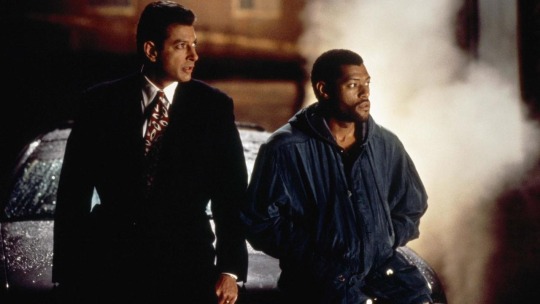
Blood on the Moon, But I’m A Cheerleader, Crooklyn, Cure, Daughters of the Dust, The Death of Dick Long, Deep Cover, The Draughtsman's Contract, Eyes of Laura Mars, Give Me Liberty, Greener Grass, Hardcore, High Hopes, The Last Party, Long Day's Journey into Night, Maiden, One Day Pina Asked, Persona, Right Now Wrong Then, Right On!, The Seventh Victim, Slightly French, Synonyms, Tammy and the T-Rex, Variety, The Watermelon Woman... and a tip of the hat to Coppola's new The Godfather Part III recut, The Godfather, Coda: The Death of Michael Corleone
42 notes
·
View notes
Text
every time i see a post about the statue that was pushed into the docks I have an ‘oh right that’s his name’ moment and then forget his name immediately. because the name of a slave trader and owner is not information i want stored in my head.
i do remember important names.
i remember Cherry Groce and Cynthia Jarrett and Leon Patterson and Joy Gardner and Oluwashijibomi Lapite and Brian Douglas and Alton Manning and Christopher Alder and Rocky Bennett and Roger Sylvester and Derek Bennett and Ricky Bishop and Michael Powell and Azelle Rodney and Jean Charles de Menezes and Mark Nunes and Habib Ullah and Sean Rigg and Seni Lewis and Jimmy Mubenga and Smiley Culture and Kingsley Burrell and Demetre Fraser and Mark Duggan and Jacob Michael and Anthony Grainger and Julian Cole and Leon Briggs and Faruk Ali and Aston McLean and Adrian Thompson and Adrian McDonald and Sheku Bayoh and Daniel Adewole and Jermaine Baker and Sarah Reed and Mzee Mohammed Daley and Edson da Costa and Shane Bryant and Darren Cumberbatch and Rashan Charles and Nuno Cardoso and Kevin Clarke and Trevor Smith and Belly Mujinga and Abigaïl Bennett. i remember the names of British POC, ESPECIALLY BLACK PEOPLE, who were killed by a corrupt and racist system.
i remember Mary Seacole and Nanny of the Maroons and Mary Eliza Mahoney and Toussaint Louverture and Rosa Parks and Martin Luther King Jr and Kofoworola Abeni Pratt. i remember the names of people who were wronged, whose legacies are an important part of Black history and global history.
i remember Dr Shirley Jackson and Madam CJ Walker and Lyda D Newman and Marie Van Brittan Brown and Valerie Thomas and Christina Jenkins and Theora Stephens and Lisa Gelobteran and Sarah Boone. i remember the names of Black women whose inventions are an essential part of our lives today, whose names are swept under the rug and hidden by the names of their white male counterparts.
i remember Jupiter Hammon and Wentworth Cheswell and Phillis Wheatley and James Derham and Thomas L Jennings and Alexander Twilight and Macon Allen and Joseph Jenkins Roberts and Charles L Reason and Sarah Jane Woodson Early and Mary Jane Patterson and Dr Rebecca Davis Lee Crumpler and John Willis Menard and Thomas Mundy Peterson and Richard Theodore Greener and Frederick Douglass and Judy W Reed and John R Lynch and Booker T Washington and Butler R Wilson and Lucy Diggs Slowe and Bessie Coleman and Josephine Baker and William Grant Still and James W Ford and William H Hastie and Crystal Bird Fauset and Hattie McDaniel and Bob Howard and Amanda Randolph and Florence LeSueur and Juanita Hall and Ralphe Bunche and Cora Brown and Dorothy Dandridge and Arthur Mitchell and Ruth Carol Taylor and Ruby Bridges and Donyale Luna and Robert Henry Lawrence Jr and Cheryl Browne and Vinnette Justine Carroll and Alan Bell and Teddy Seymour and Barack Obama and Rita Dove and Darnell Martin and Chelsi Smith and Franklin Raines and Venus Williams and Halle Berry and Sophia Danenberg and Karen Bass and Anette Gordon-Reed and Kehinde Wiley and Amy Sherald and Ruth E Carter and so many more. i remember the names of all the Black firsts who are forgotten, whose accomplishments are ignored.
don’t waste brain space on racists. learn from their mistakes, yes. but learn about the Black people they tried to silence for so long. because i can’t think of a better way to spite racists than by remembering the people they tried to make us forget.
30 notes
·
View notes
Text
Third Time’s the Charm
Fandom: Fallen Hero: Rebirth (all disclaimers to @fallenhero-rebirth)
Pairing: Chentega, Flystep (Daniel/Richard)
WC: ~3200
Tags: established relationships, edith, regina headcanons, farm headcanons, minor oc mention, reference to past suicide attempts, canon typical paranoia
It’s getting easier and easier each time.
-
Edith had finally managed to worm her way into Richard’s lap by the time Chen spoke again. It was impossible not to find her warm weight reassuring. Heavy on his thighs, an awkward shifting pressure that was pleased beyond belief to be up on the couch with him.
Focus on her. Tight brown grey curls between his fingers. Gentle eyes. Baseline. Happy. Surrounded by her people and new friendly people that smelled like food and other dogs.
“Why are we protecting Mad Dog, exactly?” He finally asked. Chen had leaned forward, elbows on his knees and hands folded together, chin resting on his knuckles.
A heavy pause and in it every bundle of nerves in Richard’s body tensing for a great unknown. Just how many of Chen’s theories had pointed to him? How many conclusions were being reached? How hard exactly was Chen going to hit him when he found out Richard had broken Daniel’s knee?
Focus on the dog. Focus on Edith she’s a good girl and she loves you and leaning in to give a quick lick to his cheek and step up, all thirty thousand pounds of her, on his stomach. Richard wheezed gently and urged her to the side, between himself and Chen, just as Ricardo answered.
“You know why Wei,” Oh. Well then. Out and open.
“Shit,” Chen echoed, shallow. Quiet. No blips on the radar. Ah, beans, he had known. Hadn’t wanted to believe it, but he’d known all the same. It felt. Strange to have to acknowledge that Chen had been willing to give him the benefit of the doubt like that. Perhaps not strange. Just. “And the...other?” Another nod from Ricardo. “Shit, shit, shit,” slow but emphatic. Meaning it. He glanced at Richard out of the corner of his eye, the look bringing an ugly slipping sensation in his stomach. His lungs. Rotation. Gravity like the moon pulling the tides. Chen turning to look at him head on.
Edith straightened up to pant at Chen, licking the air beside his face. Chen gave her a gentle pat, ruffling the hair on her head, the look in his eyes changing so slightly. Only noticeable if you were looking straight into them. They flicked to Richard and felt worlds different. Harder in a smooth edged way, rounded where there should have been scalpel thin spikes. “Why?”
Richard felt bile rise up his throat. Swallowed it. This was. Manageable. He could do this. There were a lot of why’s that Chen could be asking about. May as well start with the biggest one and work his way out.
“The woman in that photo, she,” she knew that they knew and was probably watching right know knew where he was and knew how to get to him and would be coming she would be coming and she would. Cold cold cold and suddenly Edith’s nose pressing against his neck. Gentle calm Edith. Beyond her resigned and. Questioning, confused, angry and hurt but overall resigned Chen. The great blank expanse of Ricardo. Danny. Steady and sun warmed like skin just before it blisters. A soft, registering pulse. “Made me who I am. Not in the poetic sense,” he added, as though it would help. It didn’t, Chen’s confusion bumping up slightly. “She created me. Molded me into the perfect little,” science experiment. Her pride and joy. What Frankenstein’s monster wouldn’t have given for the kind of attention Regina had given him. At least it could prove to him that the grass wasn’t always greener.
Too long a pause.
“Soldier?” Chen prompted, voice heavy.
“Dog,” Richard’s mouth decided for him. “To come when called. To heel when ordered. Roll over and play dead,” something shifted. Richard bit down. The terror was dull. Muted. Screaming from a house down the block in the middle of the night. “You know what I am?” He wanted to see it. Hear him say it. That he’d known and hadn’t said anything. To anyone. Why would?
Chen had the decency to wince. To hesitate before the nod and the quiet “Yes,”.
He hadn’t been sure before, but he was now. Clear in his thoughts and plain. Those were bridges to be crossed another time, if they were ever crossed at all. Maybe the rivers would run dry before they ever reached them. Chen didn’t seem to have any desire to travel that way either.
“She made me,” he repeated. Maybe saying it again would drive it in. No reaction from Chen, however the pulse from Daniel was felt and shelved for later discussion. Saved for quieter, hushed tones. He hated when Richard referred to himself as a thing. As being created and made. Not born. Not raised. He could keep on hating it, it wouldn’t make it less true. Bitter smoke winnowed through his lungs. “And then lost me. And then she got me back,” she wasn’t about to let him go again. But who would have thought the mangled body and mind they tortured day in and out would have the strength to escape again? “Lost me again,” like a plastic bag on a windy day, spinning out of reach.
Almost comical. To think of himself tumbling just out of her clutches.
Almost.
“When I got out. The second time. The only thing I could think of was working to take apart the place that made me. Because the people like me. The things they do in there, you wouldn’t,” he felt those words die in his throat. Another long silence edged in. A shallow, measured movement. It didn’t hurt to breathe yet. No stinging in his eyes. How messed up was it that this was getting easier? Easier to say. Ripping the same bandage off over and over again made it stick less each time. Less of a shock each time it was jerked away. “Maybe you would,” Chen had been military. And now as the Marshal of Los Diablos? There was no way he didn’t see blacked out reports. Couldn’t piece together some of the activities of the higher ups. “Anyway. It wasn’t as if I could do that legally,” again, no raised eyebrow that he was expecting. No surge of condemnation. Patience. Waiting for him to finish.
Not quite like taking a confession, but damn close to it. Richard could feel Chen taking down notes for later. For if and when he needed to arrest him. To stop him.
Something twisted in Richard’s gut and he could not tell for the life of him if it was annoyance or relief or. Didn’t matter. “I’m not a person in the eyes of law. Even out here in Los Diablos. If they wanted to strip me down and part me out like an old car they could. There was no legal way for me to work on shutting them down. Expose what they were doing. But in order for people to listen to what I needed to say, they had to take me seriously,”
“So you became Mad Dog? You became a villain?”
“I’ve been trying to build a reputation as someone exposing corruption. Someone that people will believe when I pull back the curtain on what the Farm has been up to. And I couldn’t just change my name or how I looked. As soon as people find out that I’m…what I am, it’s over. They’ll know I’m not a person. I’m literally a piece of property and no one wants a lesson in morality from their toaster,” the words were hardly out of his mouth and Daniel was out of the arm chair.
“I’m going to make some coffee,” he muttered and the words were heavy. Hard. Didn’t want to sit around and hear Richard keep talking like that but also didn’t want to argue in front of Ricardo and Chen.
“I’ll help,” and ah, beans. A tremor of nerves. Not leaving the apartment but. Okay. That was okay, the kitchen was just a few steps away and they would be just a few steps away. It was fine. Chen sat silently for a few moments while Ricardo and Daniel moved into the kitchen and then shifted his weight. The couch groaned but held and Edith eagerly oozed into the new space between them.
And then Chen spoke as he leaned in slightly. “You’ve hurt people,” a clear statement. Ordering his thoughts as much as could. Difficult when there were so many things Richard could sense he wanted to ask. Bubbling at the surface.
“I have,” easy to admit. The easiest thing. People had been sent to the hospital. And Chen didn’t even know about Mitzi. “I have ruined lives. I’ve destroyed reputations and careers and I’ve hurt people. I’ve lied. A lot. About everything you could imagine and then some things you couldn’t begin to guess at,” sensing it coming. Chen did frown at that. More, apparently, at the implication that he couldn’t imagine. His mind was turning. But not in a direction that Richard could follow. “I’ve stolen. Cheated. Done things that would make your skin--,”
“You haven’t killed. Not as Mad Dog,” Not a question and. Thinking about Marconi’s house. Thinking about the overpass. The bridge. Every fight with Argent and every near miss. The dozens of other times he could have and didn’t. Richard felt the muscles in his chest tighten and clench, battening down against the rising swell of.
“I almost killed Daniel,” that one still hurt to say. That one was never going to dull. Flinchy nerve endings sending panic signals up and down his legs.
Chen’s entire body seemed to stiffen. Eyes back to sharp and mouth a firm hard line. A minor surge of anger. A roll of thunder that made Richard’s teeth ache. “You didn’t though,.. and he’s still?” there was the flash of uncertainty. “He’s forgiven you?” disbelief, which was beyond fair. Followed hot on its heels was. A minor debate. Something inside him telling Chen that it wasn’t any of his business and if Daniel had forgiven him then. Fighting with the throat creaking thought that Richard was manipulating Daniel into forgiving him. Doing something, psychic or not, to force him into staying.
“He shouldn’t have,” it wasn’t meant to be a whisper, but it came that way nonetheless. It still rested like oil on water, dark and slick and rancid. He shouldn’t have. “I didn’t want him to, when I told him I,” his apology should have never been accepted. He should have hated Richard, despised him and. And. Ah, beans.
“You told him? It wasn’t that he found out somehow?” doubt and confusion. It didn’t make sense for Richard not have continued lying about it. But it would have made it so much worse in the long run. The longer one waited to reveal a lie, the worse it always was.
Painful even to hear in his own voice. “I couldn’t live with myself,” and that more than anything so far that night felt raw. Exposed. Richard hadn’t even found the courage to talk with Finch about. It hadn’t been too many times that he’d actually tried anything. Thought about it more than took measures. But. He’d stood up on the edge of the rooftop the first night after they’d slept together. Drunken fingers had fumbled the noose he’d tied out of bedsheets. And after the confession, if Daniel had told him to throw himself in front of a train, he probably would have. “Are you going to arrest me tonight?” It was probably the first time he’d ever hoped the answer would be no.
He’d wanted Daniel to arrest him so that he could have a reason to kill himself. And there was a part of him that had wanted Ricardo to stop him ever since they day he’d seen the fool in the diner. Chen made a heavy sound.
“Not tonight,” he said and a trickle of relief ran down Richard’s spine.
He hadn’t been paying attention to what his face was doing, had he? Chen had been. There was a sudden jack knife turn, away from that destination.
“How long has Ricardo known?” tempered with. A great many things. Too many emotions to pick one for certain but Chen’s eyes darted back over his shoulder to where Ricardo and Daniel were whispering in the kitchen. Not. Well, no. No, there was jealousy. But not because Richard had told the others first. Jealousy from. It was faint and growing fainter. Chen actively stamping in down, pushing it away. Didn’t want Richard to feel that. Tossing it under the rug before company came.
Richard could see the outline of it, even still.
Ricardo had protected him. Lied to Chen to protect him and. Had Richard revealing the truth to Ricardo been the thing to? What drove him to?
It felt like a punch to the back of the head. “Maybe,” hard to make the mouth work because how could he think that? Which wasn’t fair at all, because Richard knew exactly how he could think that. Ricardo was his best friend. And there had been that awkward tension for years because of his little crush. And then Heartbreak. And Ricardo had never quite gotten over it and then Richard had come back like a terrible phantom and then. And then, on the outside, there was a long period of them getting closer. Even with Daniel thrown into the mix, the assumption that he and Ricardo were. “It was maybe a few months ago? It uh. When we had those monsoon rains. We. Daniel and I, invited him to dinner. And I told him everything,”
That hurt. Not him, not him, that hurt Chen to hear and ah, beans. Richard swallowed what he hoped was going to be his entire tongue. “I can’t tell you what was going on in his head that night,” which wasn’t nearly as kind sounding as he had wanted it to be. “But whatever was…there was never anything between us like that,”
“Except that you kissed him,” a pause as things fell into place. “After you beat him and Daniel up,” gloating, he assumed. A victory lap. Rubbing it in that Richard could defeat them both.
Richard fought back the wince and failed, letting his gaze slip off of Chen and onto Edith, who was doing her best to nose Chen’s hand into petting her. “I did,” a half sigh. “It was before…before a lot of things had happened. Changed. And I kissed him on the forehead,” and important detail, just in case Ricardo had omitted that in his retellings. “He. He went to you after he left me and Danny didn’t he?”
A smaller stab. A shift in the weight on the couch. Petting Edith carefully. “He did.” But Chen made it sound like fatal wound anyway.
“If…If I had to guess,” No, don’t do that. “No. You’re going to have to ask him, Chen. I can only tell you that he’s not,” he’s not settling for you, he didn’t say. Couldn’t say because it wasn’t for him to do that. That terrible little conversation was going to be for Ricardo to deal with on his own. Preferably in private. If Chen ever admitted to feeling that way. “We were never in love like that,” direct it away from there, if only for Chen’s sake. “Not the way Daniel and I are,” a non-committal grunt.
The space between them would have been a great deal more tense if Edith hadn’t rolled onto her back, unsubtly demanding belly rubs from her new friend. Chen obliged and the distraction opened the streets back up. Another hard turn. Tires shrieking with the friction. The roads of Chen’s mind were twisty and frequently coated in black ice. Difficult to keep up on without skidding completely out of control.
“Why didn’t you tell us back then?” not the entire question. Why hadn’t he told Ricardo or Anathema or.
“I couldn’t trust that any one of you wouldn’t turn me in,” a shudder ran down his shoulders. Wasn’t being watched. The apartment was clean and Daniel and Ricardo were in the kitchen and it was fine. “I had heard the things Ricardo had said about the Special Directive. The things you said about them. Freaks and monsters. It didn’t really inspire confidence to hear Anathema joking about whether or not they…And...you know by now that I was certain you hated me back then,” Chen gave a minor nod. Not his proudest moment, they both knew. It wasn’t worth digging at. “I kept trying to build myself up to it, and then something small would happen. Always minor but I’d take any excuse not to take the risk. And then heartbreak,”
Movement. Ricardo and Daniel returning with coffee, plunking down mugs onto coasters. Edith raising up slightly, the dull thud of a wagging tail at Danny returning to the room. Ricardo took the armchair while Daniel folded his legs up under himself and floated at head height.
“Good talk?”
“A talk,” Chen gave back.
“Enough for tonight,” Richard allowed, wondering briefly if he was allowed to turn the attention off of his own interrogation. After a moment of staring at the mug of coffee in front of him, he decided that he didn’t care either way. “You saw that Regina’s going to try to kill me? Or Senator Carmichael is?” Chen leaned back in the couch slightly, letting them have a better line of sight to each other. He also turned his head to take in Ricardo’s face. “The papers you saw actually said that?”
Ricardo blinked and took a long drink from his mug. Considering. “You think they aren’t?”
“Regina didn’t want me to die even after I escaped the first time,” as if that was a good enough reason to doubt what she had let them see on that security footage. “I’m an investment. Money, time. Her pride,” And. Oh and. “And now she knows that I have information about you. All of you. She’ll want to extract that from me,” Daniel shifted in the air at ‘extract’. “She’s going to have just as many questions for me as you all did. If I die during that, inside that place…,”
Well.
Those were just rumors, weren’t they? That the mind of a regene could be plugged back in like a dead phone battery. Bodies couldn’t be, certainly. But a consciousness? If the way he could jump into empty shells like Mitzi was any indicator, Regina could torture him from one vessel to another until his mind gave out. “She doesn’t want me dead. But she must be salivating at the thought of being able to get her hands on the likes you,”
“So you’ve said,” Ricardo pointed out, setting his coffee down and leaning back in the arm chair. “That the Farm would love to get their hands especially onto boosts like Daniel. Or Angie,”
“Yeah, but when I was talking about it I was lying to myself that I could do something to protect them from her,” Daniel opened his mouth slightly to say something, thoughts sweeping in that he could protect himself, thank you very much. And so could Argent. Richard didn’t give him the chance. “And she has uses for mods. They make for excellent…supplemental material,” Ricardo and Daniel cringed. Chen still didn’t know enough to be disgusted. He didn’t interrupt. “If anything she’s going to do whatever she can to have us taken in alive,” Richard grimaced, reaching out and taking his coffee mug into his hands. “So. What did she let you see?”
#fhr#fallen hero fanfic#fallen hero spoilers#fallen hero rebirth#fallen hero retribution#ortega#herald#chen#sidestep#richard abekket
37 notes
·
View notes
Text
How can we effectively reduce our carbon footprint?
Over 1,000 scientists on the Intergovernmental Panel on Climate Change (IPCC) have some thoughts.

This climate science arm of the United Nations highlights the causes of climate change and how to mitigate it. You can read a digestible version of the IPCC’s latest findings in its 2014 Summary for Policymakers. The next IPCC reports (AR6) should start coming out next year.
The policymaker summary explains that the main human contribution to climate change is the consumption of fossil fuels (i.e., oil, coal, natural gas) for energy. Burning fossil fuels releases greenhouse gases (GHG), including carbon-based molecules like carbon dioxide and carbon monoxide, into our atmosphere.

Drilling down a bit (pun intended), The Guardian and climate scientist Richard Heede identified 20 fossil fuel and energy companies responsible for a third of the total carbon emissions since 1965. Most are government owned.
With much of our carbon emissions coming from huge corporations and government entities, how can any of us make a difference?
Columbia University’s Earth Institute lists broad categories to help you assess your current lifestyle and provides tips to minimize your carbon footprint. How you go green will look different depending on your circumstances. More than anything, reflect on the major ways you contribute to carbon emissions and identify steps you can put into action.
1. Food

o Consider that vegetarian or vegan life. Purchasing and consuming less meat and dairy means less CO2 and methane from feed production and processing.
2. Clothing
o Buy less new and more second-hand clothes. 80lbs of the apparel we each throw away per year produce methane as they decompose in landfills.
3. All purchasing habits
o Use reusable bags at check out and support environmentally conscious businesses when possible.
4. Home
o Energy is a large contributor to carbon emissions. Think about how to be energy efficient at home. Swap out incandescent light bulbs for more efficient LEDs. Use less hot water, keep your thermostat a bit higher in summer (or use fans) and slightly lower in winter.
5. Transportation

o Find greener forms of transportation when you can. This may mean biking or walking more, or using public transportation instead of driving yourself. If you fly a lot for work or pleasure, this is likely the biggest part of your carbon footprint. When you have to fly, go non-stop (landing and takeoff use more fuel) and sit in economy class (more people are transported per flight in economy compared to business class).
6. Carbon offsets
o Financially support climate protection projects and organizations.
So you make all these lifestyle changes. Then what? The major carbon producers are still massive fossil fuel and energy companies.
7. Political Action
o Like it or not, we all play a role in getting the policy and law makers to prioritize reducing carbon emissions while moving us toward more sustainable energy solutions. This means voting and getting politically involved at the local and national level to let your representatives know your stance on climate change and carbon emissions.

References:
Taylor, M. & Watts, J. (2019). Revealed: the 20 firms behind a third of all carbon emissions. https://www.theguardian.com/environment/2019/oct/09/revealed-20-firms-third-carbon-emissions
IPCC. (2014): Summary for Policymakers. Climate Change 2014: Mitigation of Climate Change. Contribution of Working Group III to the Fifth Assessment Report of the Intergovernmental Panel on Climate Change (Edenhofer, O., R. Pichs-Madruga, Y. Sokona, E. Farahani, S. Kadner, K. Seyboth, A. Adler, I. Baum, S. Brunner, P. Eickemeier, B. Kriemann, J. Savolainen, S. Schlömer, C. von Stechow, T. Zwickel and J.C. Minx, eds.). United Kingdom and New York, NY: Cambridge University Press. https://www.ipcc.ch/site/assets/uploads/2018/02/ipcc_wg3_ar5_summary-for-policymakers.pdf
Cho, R. (2018). The 35 Easiest Ways to Reduce Your Carbon Footprint. https://blogs.ei.columbia.edu/2018/12/27/35-ways-reduce-carbon-footprint/
Image Sources:
GIF 1
Image 1
Image 2
GIF 2
GIF 3
3 notes
·
View notes
Text
Residential property design in post-Covid world
COVID-19 Construction Report, Coronavirus Real Estate Impact Advice, 2020 Guide
Residential property design in a post-Covid world
3 Nov 2020
Placemaking ‘settlements’ with eco-credentials:
image : Withers
How property design will be different in a post-Covid world
Covid-19 is accelerating rapid change in what we want from our homes and how housing developments are designed, a new report from international law firm Withers explains.
COVID-19 Residential Property Design Report
The report, which features insight from fifteen world-leading business and property experts, discusses the impact of Covid-19 on how we use our homes as well as where we want to live.
Key considerations that the experts anticipate are driving a rapid shift in where and how new homes are developed in the post-Covid world include: an increased demand for a more flexible living space; a greater focus on a home’s locality and nearby amenities; a heightened aspiration for community; and a greater emphasis on more sustainable and environmentally-friendly construction methods.
Homes will no longer serve a purely domestic purpose…
According to the experts, people will expect their homes to deliver much more because they will no longer serve a purely domestic purpose – they will become places that must fulfil home, work and social needs.
‘The home won’t just be a trading commodity you return to, play video games, have sex and go to sleep. People will be more interested in their living space.’
Robert Adam, Founder, Robert Adam Architecture Consultancy.
Spending more time in the home will also lead to more in-home entertaining. In the experts’ view, this will elevate the importance of these aspects of the home and this will be felt in design.
Location, location, location will mean a move from city centres…
Property agents have reported an increase in the number of people moving from city centres in the wake of Covid-19, to locations that are further afield than people had traditionally considered. These locations are not rural but offer a feeling of being outside of the central metropolises while still being well served by the kind of amenities and resources they are used to.
There have also been reports of increased demand for homes in well served villages, market towns, and coastal areas within an hour and a half journey to the cities; as home working offers more freedom and people look for more living space and greener environments.
Homeowners will expect more amenities on their doorstep…
As more time is spent at home, for one purpose or another, experts believe that the immediate locality will have to satisfy needs that were previously met elsewhere. Wherever people live, they will expect more amenities, variety, and infrastructure to be provided locally.
Withers’ experts believe that people have embraced local services and retailers during the pandemic and have questioned their use of larger national providers in a way that they hadn’t done previously. In some instances, confidence in national retailers was undermined by shortages and people discovered that there was more choice on their doorstep than perhaps they had appreciated.
‘As people have refocussed on getting provisions nearby, local businesses have seen a real boost… there’s been a nice re-discovery of traditional local shops’
Richard Pickering, Chief Strategy Officer, Cushman & Wakefield.
image : Withers
Suburbia will need to reinvent itself…
People’s expectations and requirements might have moved on, but the experts believe that suburbia has been slow to adapt. A theme from the report is that the suburbs feel tired and lacklustre and in their current configuration they are ill equipped to accommodate the resurgence in demand for community, brought about by an increased amount of time spent at home.
Withers’ experts believe that suburbs will need to become destinations that people want to spend time in, rather than simply travel to or from. Ultimately this is about creating a sense of community where perhaps it had been lacking, for which you need the businesses, shops, services, and amenities that make community possible.
‘The suburbs are knackered. They aren’t community hubs because they were built to be driven out of, so there’s nothing there’
Robbie Kerr, Director, ADAM Architecture.
‘Early 20th century suburbia that have very little to offer, homogenous outdated houses, there’s no ‘there’, there… the challenge is to create new settlements around them… it’s difficult to urbanise a suburb, but it needs doing’
Professor Yolande Barnes, Chair at Bartlett Real Estate Institute, University College London.
Vertical villages – buildings that offer housing, amenities, working spaces and ‘green’ space:
image : Withers
New housing developments could look and feel a little different…
There is a prevailing sense that new settlements will be characterised by mixed use, mixed tenure, and mixed community features. The experts believe that housing developers will have to think harder about how to achieve this and these design considerations are likely to rank higher up the agenda than they have done historically.
‘Placemaking is a buzzword that has come to define a lot of the debate around the future of real estate after the pandemic and is perhaps best characterised as the creation of a space with a unique community which enhances quality of life. The norm is a nod to placemaking with a duck pond in the middle of a housing estate, but new settlements need long term management and curation’
Professor Yolande Barnes, Chair at Bartlett Real Estate Institute, University College London.
A home’s eco-credentials will be considered more…
The experts believe that new home buyers will drive demand for sustainability in new homes and settlements, and that developers may have to deliver on sustainability and environmental promises as never before.
‘Housebuilders will want to develop and build a reputation based on both their eco credentials and also their placemaking credentials’
Lucian Cook, Head of UK Residential Research, Savills.
Jeremy Wakeham, CEO of the Withers Business Division and a commercial real estate partner added:
“The world over, the buildings we work, live and socialise in are wrestling with the challenge of catering for our new demands and this presents extraordinary opportunities. This report examines this historic turning point in attitudes and practices to how we use property across all areas of our lives.
“Homes are taking on a new level of importance. Our respondents anticipate that people will expect their homes to deliver much more because they will no longer serve a purely domestic purpose. As more time is spent at home, for one purpose or another, the immediate locality will have to satisfy needs that were previously met elsewhere. Wherever people live, they will expect amenities, variety and infrastructure to be provided locally. Getting behind the right targets at the right time will be crucial for investors and developers.”
The future of real estate report: work, home and social, can be found at: https://reports.withersworldwide.com/the-future-of-real-estate/cover/.
image : Withers
Background
Report Methodology
Murmur Research was commissioned by Withers to investigate the impact of Covid-19 on the future of home, work and socialising. They conducted interviews with 15 experts who are well known figures within property, architecture, land development, hospitality, and academia.
The Experts
Robert Adam – Robert Adam Architectural Consultancy
Yolande Barnes – University College London
Lucian Cook – Savills
Nectar Efkarpidis – Molonglo
Jonathan Harbottle – Land & Partners
Philip Harvey – Property Vision
Robbie Kerr – ADAM Architecture
Katrina Kostic Samen – KKS Savills
Marcus Loo -Savills
Islam Mahdy – Credence Hospitality Developments
David McDowall – BrewDog
Chris Miller – White Rabbit Fund
Mat Oakley – Savills
Richard Pickering – Cushman & Wakefield
Mark Williams – Queen Mary School of Business
About Withers
Withers is an international law firm with a broad-ranging client base including multinational corporations, governments, international institutions and individuals and their businesses.
With over 170 partners and more than 450 other lawyers, we have unparalleled expertise in commercial, tax, trusts, estate planning, financial services, litigation and international arbitration, public international law, real estate, charities, philanthropy, employment, family law and other legal issues facing individuals and their families. The firm has advised 70% of the top 100 UK Sunday Times Rich List, 25% of the Forbes 400 List, 35% of the Hong Kong Forbes Rich List, and 35% of Forbes Asia’s Richest Families list.
Withers has 17 offices worldwide in London, New York, New Haven, Greenwich (Connecticut), San Francisco, San Diego, Los Angeles, Rancho Santa Fe, Hong Kong, Singapore, Sydney, Tokyo, the British Virgin Islands, Geneva, Milan, Padua and Cambridge.
Residential property design in post-Covid world images / information received 031120
Coronavirus Impact
Previously on e-architect:
COVID-19 construction industry reinvention
COVID-19 construction industry reinvention
Building Resilience Construction Report
Building Resilience Construction Report
APM Covid-19 outbreak online resources
APM Covid-19 outbreak online resources
IWBI Task Force on COVID-19 News
IWBI Task Force on COVID-19 News
How Buildings Can Reduce Health Burden of COVID-19
Buildings Can Reduce Health Burden of COVID-19
Architecture and Pandemics: Covid-19 Hermetic Verticalism
Architecture and Pandemics
Covid-19 Quarantined Architects Database
Database for Quarantined Architects
Impact of COVID-19 on the London Property Market
Coronavirus Impact on Property Market Article
Remote Working During the COVID-19 Pandemic
COVID-19 Remote Working
Global equity markets have been hit hard by the coronavirus, which has been the catalyst for the biggest market sell off since the 2008 crash.
coronavirus stats
For all the latest breaking news on COVID-19 visit the UK government website page: Coronavirus (COVID-19): UK government response.
Comments / photos for the Residential property design in post-Covid world page welcome
The post Residential property design in post-Covid world appeared first on e-architect.
1 note
·
View note
Text
Laundry tweaks can help clothes last longer and pollute less
Did you ever notice how your favorite clothes lose their color and seem flimsier with time? Washing may be to blame. A new study has shown just how much the time and temperature of a wash cycle can affect clothing.
It found that clothes lose less dye and fewer fibers when washed in shorter cycles and in cool water. That means they will fade and thin less. These wash settings are greener, too — as in better for the environment.
As clothes swish around in a washing machine, some of the fabric’s fibers loosen and wash away. Clothes also lose some of the dyes that had colored them. We may not notice a difference right away. But over time, clothes can turn dull. Fabrics can thin. The dyes and fibers lost in the wash water will end up in the environment.

Clothes release fewer dyes and fibers when washed at a lower temperature for a shorter cycle, new data show.Rawpixel/iStock/Getty Images Plus
“There is some sort of environmental impact to almost everything you do,” says Lucy Cotton in England. She is the study’s lead author. She worked on the project as a grad student at the University of Leeds. Her research team put together two batches of clothes to launder in tests. One had dark-colored t-shirts. The other had shirts in vibrant, lighter colors. Each load had various cotton and polyester fabrics. Their dyes and fibers were typical of the mix of clothes laundered at home.
The team also included in each wash load 18 swatches of white t-shirt fabric. Those white fabrics can absorb dyes lost in the wash from colored fabrics.
The team washed each type of load in the same machine. They used two different cycles. The “cold express” wash lasted 30 minutes and used 25° Celsius (77° Fahrenheit) water. The “cotton short” cycle used 40 °C (104 °F) water and ran for 85 minutes. After each cycle, the team collected fibers in the wash water and from an extra empty wash cycle afterward. (That extra cycle rinsed any leftover fibers out of the machine.) The team repeated the wash cycles and extra empty rinses 16 times for each load and cycle. The group then let the clothes air-dry for a full day.
Afterward, the team compared the t-shirts and white swatches to ones that had never been washed. They used an instrument called a spectrophotometer (SPEK-troh-foh-TOM-eh-tur) to gauge the color of each sample.
How laundry loads stacked up
All shirts lost more color when washed in hot water on the longer cycle. Cotton ones faded more than the polyester ones. The team also stirred swatches of the dark t-shirts in water at 20 °C (68 °F), 40 °C and 60 °C (140 °F). Room-temperature water released less dye than the hotter water did.
The shirts also lost more tiny fibers in the longer, hotter cycle. Those microfibers matter because they give fabric its heft and strength. Lose too much and the fabric will thin and weaken. Those microfibers also will pollute waterways.
Water from the long and hot wash and rinse cycles collected about 40 percent more fibers from the dark load compared to the cool express cycle. Lighter-colored clothes in the long, hot wash lost around 30 percent more. And the effect continued the more the clothes were washed. The team still found the hot, longer loads released at least 40 percent more microfibers than the cool cycles after eight or 16 washings.

A laundry lab at Procter & Gamble’s Newcastle Innovation Centre in the United Kingdom let researchers compare the effects of washing identical loads of laundry at different settings.P&G
“The duration of the wash cycle could be the most important factor,” says study co-author Richard Blackburn. As a chemist, he heads the Sustainable Materials Research Group at the University of Leeds. The longer the cycle, the more the fabric is shaken and rubbed against other fabrics. The fabric also sits in water longer. But temperature matters, too. Hotter water can make fabric fibers swell. And that can make fibers more likely to break, he adds.
The team published its findings in the June 2020 issue of Dyes and Pigments.
“This is a well-designed study,” says Mourad Krifa. He’s an industrial engineer who studies textiles and clothing. He works at Kent State University’s School of Fashion Design in Ohio. The new study, he adds, “clearly shows” that color and fiber loss in the wash “increase with cycle duration and temperature.” He would like to see follow-up work that looks into whether these factors affect other types of fabrics in the same way.
Greening our cleaning
“Nobody wants to wear a t-shirt that doesn’t look as good as when you first bought it,” says Blackburn at Leeds. With that in mind, it makes sense to wash clothes in cooler, shorter cycles, he says. Your shirts will still get clean. Modern detergents are made to work in cooler, shorter cycles, he explains.
A shorter, cooler wash cycle also is easier on the environment. First, it cuts down on energy use. Electricity from fossil fuels adds to greenhouse-gas emissions, which drive human-caused climate change. Using less energy saves money, as well.
Shorter, cooler wash cycles also cut water pollution. Dyes can contain hazardous chemicals. And all of those lost fibers add up. Those shed in a typical wash load make up a wad about “the size of a chewing gum,” says Flávia Salvador Cesa. She’s a graduate student at the University of São Paulo in Brazil.

These tiny microfibers came out in the laundry wash water, in a study. The fibers carry dyes from the washed t-shirts.University of Leeds/P&G
Cesa was part of a research team that estimated the loss of fabric fibers each year due to washing machines across the globe. The total comes to about 18,300 metric tons (21,200 U.S. short tons) of cotton and 12,500 metric tons (13,800 U.S. tons) of synthetic fibers. The team looked at prewashing of fabrics by manufacturers. It also looked at how the use of detergents or better filters on consumers’ washing machines might help. A combination of those measures might cut the total fiber loss by about half, her group now reports. Yet many tons still would wash away into waterways.
The team shared its findings in the February Environmental Pollution.
Fibers lost in the wash can wind up in oceans, lakes and streams. Those fibers make up about one-third of all microplastics in waterways. That’s the estimate of a 2017 report by the International Union for the Conservation of Nature.
But it isn’t just a plastics problem. Spanish and British researchers studied microfibers in a deep area of the Mediterranean Sea. About eight in every 10 were cotton and linen. That study was published in 2018. “Even though it’s cotton and it’s a natural fiber, it’s clearly not degrading in that marine environment,” Blackburn notes. He and other scientists are trying to learn why. Other scientists are studying the effects of these polluting fibers on sea life.
Cesa likes that the shorter, cooler wash cycles suggested by Cotton’s group can provide many benefits — from less pollution and lower consumer costs to better-looking clothes.
And, just as little wads of microfibers add up to tons of waste, even small steps to cut waste will also add up. “Everything that you can do can make a difference,” Cotton says, “even if it is something as simple as changing your wash settings.”
Laundry tweaks can help clothes last longer and pollute less published first on https://triviaqaweb.tumblr.com/
0 notes
Text
LEIGH TOWNSEND

Full name: Leigh William Townsend.
Nickname(s): Lee apparently cause people can’t spell for shit.
Date of birth: May 24th 1989.
Hometown: Canterbury, England.
Faceclaim: Robert Pattinson.
Gender, pronouns: Male, he/him.
Sexual orientation: Heterosexual.
Occupation: Tour guide, aspiring comedian.
Languages spoken: English (native), French (conversational... or so he thinks).
Alignment: Neutral good.
Hogwarts house: Slytherin.
Personality type: ISFP-T — The Adventurer.
Zodiac: Gemini (capricorn moon, aries rising).
Five positive traits: Eloquent, adventurous, sharp-witted, personable, thrifty.
Five negative traits: Sarcastic, know-it-all, pessimistic, frustrated, flippant.
Ten tropes: Grass Is Greener, Performance Anxiety, Crowd Pleaser, The Movie Buff, Fleeting Passionate Hobbies, Hates the Job; Loves the Limelight, Brilliant but Lazy, Deadpan Snarker, Spot of Tea, The Slacker.
Inspo song: Sometimes Life Isn’t Easy by Mew.
Obsessions: Richard Ayoade, Q.I., hating on American TV, toast, Stephen Fry.
Quote: “I grew up just a stone’s throw away from where that whole family died from mysterious head injuries.”
Introduction:
Life is dreadful, cruel irony. Leigh wants to be recognized for his wit, to secure an audience... but this isn’t what he wanted. Every day he gets up there with hit little mic, but it’s in front of a new horde of dumb tourists who don’t appreciate his jokes. They want facts, and he delivers them. Having an outlet for all his otherwise useless trivia is grand in a way, but he’s a little burned out from sticking to the same old script he’s already gone through for the past 1,743 work days... but who’s counting, right? Some of the facts have probably changed a little along the way, sometimes he just makes something up to satisfy some Texan woman’s question. Who the fuck actually knows when some random shop was founded? Google it, Debra.
As cool and disengaged he is at work, he’s a terrible mess when he actually tries to go for it and pursue his dreams. Someday he’ll get through a whole open mic slot without stuttering and forgetting half his material. Without playing a sad little salute to himself on his kazoo to poke fun at the situation like he’s totally not bothered by it. Someday he’ll be on the Q.I. panel and Stephen Fry will shake his hand... maybe Fry isn’t on the show anymore, but that’s not the point. It’s a metaphor, a metaphor for how it’s all absolute bollocks and nothing ever turns out how he’d hoped.
1 note
·
View note
Text
New Evidence of Age Bias in Hiring, and a Push to Fight It
More than half of the 54 million American workers over 50 lose longtime jobs before they are ready to retire, If you were recruiting for a quality manager, and the quality manager applicant had significant experience and aced the phone interview, would you offer the applicant a job if, upon showing up for the interview, you realized the applicant was 71 years old: (1) Yes, (2) No? Why? What are the ethics underlying your decision?
Across the United States, mammoth corporations and family businesses share a complaint: a shortage of workers. As the unemployment rate has tunneled its way to a half-century low, employers insist they must scramble to lure applicants.
The shadow of age bias in hiring, though, is long. Tens of thousands of workers say that even with the right qualifications for a job, they are repeatedly turned away because they are over 50, or even 40, and considered too old.
The problem is getting more scrutiny after revelations that hundreds of employers shut out middle-aged and older Americans in their recruiting on Facebook, LinkedIn and other platforms. Those disclosures are supercharging a wave of litigation.
But as cases make their way to court, the legal road for proving age discrimination, always difficult, has only roughened. Recent decisions by federal appeals courts in Chicago and Atlanta have limited the reach of anti-discrimination protections and made it even harder for job applicants to win.
It is complicating an already challenging juncture of life. Workers over 50 — about 54 million Americans — are now facing much more precarious financial circumstances, a legacy of the recession.
More than half of workers over 50 lose longtime jobs before they are ready to retire, according to a recent analysis by the Urban Institute and ProPublica. Of those, nine out of 10 never recover their previous earning power. Some are able to find only piecemeal or gig work.
“If you lose your job at an older age, it’s really hard to get a new one,” said Richard Johnson, an Urban Institute economist who worked on the analysis.
‘The Look in Their Eyes’
Tom Adair dressed in a sharply pressed white shirt and a blue blazer with gold buttons for the weekly meeting for ExperiencePlus, a group for job seekers over 50 held in the small library at St. John the Baptist Church in Madison, Ala., near Huntsville.
A former quality manager at Toyota and an Air Force consultant, Mr. Adair said he has had temporary consulting assignments over the last decade but has not been able to get a steady full-time job since the recession’s nadir in 2009.
“I ace the phone interviews,” Mr. Adair said. “They say: ‘Your résumé speaks volumes. You could hit the ground running. It looks like you’re the perfect fit.’”
“But you come in, and you’re D.O.A.,” said Mr. Adair, who is 71 and has neatly clipped gray hair. “You can see the look in their eyes.”
“My wife says: ‘We need to get you a face-lift. We need to get your hair dyed,’” he said.
Older workers are much more likely to wrestle with prolonged joblessness than younger ones, according to the Bureau of Labor Statistics. On average, a 54-year-old job hunter will be unemployed for nearly a year.
Repeated inquiries can go unanswered, like space probes lost in a distant galaxy. In one of the most comprehensive studies, résumés were sent out on behalf of more than 40,000 fictitious applicants of different ages for thousands of low-skill jobs like janitors, administrative assistants and retail sales clerks in 12 cities. In general, the older they were, the fewer callbacks they got.
Those in their 60s “never do better, and often do worse,” than those a decade or two younger, said David Neumark, an economics professor at the University of California, Irvine, who oversaw the research.
It is toughest for women, who suffer more age discrimination than men starting in their 40s, the researchers found. “The evidence of age discrimination against women kind of pops out in every study,” Mr. Neumark said.
As for Mr. Adair, he said he had been through the same job-application routine so many times that it felt like “Groundhog Day.” Over the years, he consulted three lawyers about age discrimination. Each time, they advised that an individual lawsuit would not be worth the legal costs.
With a small pension and Social Security, he said, he and his wife are “just getting by.”
“It’s devastating,” Mr. Adair said. “You go through the stages just like dying. First you can’t believe it. You’re so sure and your wife is so sure, and even the recruiter is. Then you get mad.” By the end, you feel like giving up, he said.
Wanted: Greener Employees
Hiring complaints and lawsuits are rarely filed because they are difficult to prove and the cost is high, said Robert E. Weisberg, a regional attorney with the federal Equal Employment Opportunity Commission in Florida.
To bring a case against Seasons 52, a national restaurant chain, Mr. Weisberg said, the commission looked to establish a pattern of bias over a period of years by combining statistical analyses with testimony from applicants.
The agency examined whether the chain could have hired so few applicants 40 or older if there had been no age discrimination, and calculated the odds at less than one in 10,000, according to court documents. The commission also collected affidavits from 139 applicants at 35 restaurants.
George Simmons was 45 when he applied at a Seasons 52 in Lone Tree, Colo., in 2014. “My interview was going well until the interviewer asked me my age,” he stated. After he answered, he said, he was shown the door. “I asked what was the problem,” he said, “and the interviewer responded that the restaurant was looking for younger people.”
Heidi Barsaloux was 44 when she applied for a bartender position at a Seasons 52 in Schaumburg, Ill., in 2010. “An interviewer told me that they were not looking for people with that much experience and wanted people who were more green,” she said.
A third applicant was told, “We are not looking for old white guys.”
Ultimately, the chain, part of Darden Restaurants, agreed last year to pay $2.85 million and hire a monitor to prevent discrimination against applicants over 40. As part of the settlement, the chain denied any wrongdoing.
There have been other legal offensives.
The Communications Workers of America has filed a lawsuit on behalf of millions of older Americans against Amazon, T-Mobile and Cox Communications, accusing them and hundreds of other major employers of systematic age discrimination in hiring based on targeted online advertising.
The union and several workers have also filed complaints with the Equal Employment Opportunity Commission against more than 70 employers and employment agencies related to age discrimination in recruiting. It expects that some of those will turn into class-action lawsuits.
By exposing so much of the help-wanted process on the internet, “the transformation to digital recruiting has shined a spotlight on how discrimination happens, and it’s made it much easier to do so,” said Peter Romer-Friedman, a lawyer at Outten & Golden working with the union. “We’re going to start going after these companies, one by one.”
And in a broad settlement with civil rights groups and the union, Facebook agreed to eliminate the ability of advertisers to screen out minority groups, women or older job seekers from seeing particular help-wanted listings.
Facebook itself can control which ads users see by delivering them based on age, gender and ZIP code.
“We want the E.E.O.C. to declare that this type of exclusionary advertising is unlawful” on any online platform, Mr. Romer-Friedman said.
Joe Osborne, a Facebook spokesman, said the company had taken steps to combat hiring discrimination and was exploring what more to do.
A Cap on Experience
Dale E. Kleber had been out of work for three years when he saw a posting in 2014 for a legal position at CareFusion, a medical technology company. At 58, with three of his four children living at home, in a suburb of Chicago, he was feeling the financial strain of prolonged unemployment.
So even though the ad specified that applicants should have no more than seven years of experience, Mr. Kleber applied. CareFusion ended up hiring a 29-year-old.
Mr. Kleber, a veteran lawyer and former general counsel of a national dairy and food company, sued, arguing that a limit on experience effectively ruled out older applicants.
“Litigation is a terrible way to settle disputes,” said Mr. Kleber, who during his career had defended companies against complaints filed with the E.E.O.C. “It’s a very uncertain process, it is fraught with risk, and sometimes it comes out wrong.”
Putting a cap on experience, though, “just seemed so egregious,” he said.
The United States Court of Appeals for the Seventh Circuit did not agree. In a ruling this year supporting CareFusion, it stated that recruiting practices that have the effect of screening out older applicants — what is known in legal terms as having a “disparate impact” — did not violate the law.
The decision mirrored one involving R. J. Reynolds Tobacco made earlier by the Court of Appeals for 11th Circuit in Atlanta, which the Supreme Court declined to review. It ruled that unlike employees already on the payroll who can show that a policy has a negative impact on a group regardless of the motivation, applicants would have to prove intentional discrimination.
Troy Kirkpatrick, a spokesman for Becton Dickinson and Company, which owns CareFusion, said, “We are deeply committed to providing equal employment opportunities and a workplace free from discrimination, and as such we are pleased with the decision from the Seventh Circuit Court of Appeals.”
In April, Mr. Kleber and the AARP Foundation asked the United States Supreme Court to review the case.
“It defies common sense,” Mr. Kleber said, to think Congress “intended to offer greater legal protections to people who have jobs than people looking for jobs” when it passed the Age Discrimination in Employment Act in 1967.
Other older workers and advocates elsewhere are making the same argument, pushing for a broader interpretation of the law.
In a federal court in California, a class-action lawsuit against the global accounting firm PwC that claims “substantial evidence of age disparities in hiring” was certified in April. The company noted on its career website and in reports that the average age of its 220,000-member work force was 27, and that 80 percent of the staff members were millennials (born after 1981).
PwC responded that the company’s “hiring practices are merit-based and have nothing to do with age.” It added, “The plaintiffs’ accusations are false, and we will prove that in court.”
0 notes
Text
Quotes for Wednesday July 26,2017
Confidence quotes If you really put a small value upon yourself, rest assured that the world will not raise your price. Pay no attention to what the critics say. A statue has never been erected in honor of a critic. -Jean Sibelius When the grass looks greener on the other side of the fence, it may be that they take better care of it there. -Cecil Selig When you have confidence, you can have a lot of fun. And when you have fun, you can do amazing things. -Joe Namath If your happiness depends on what somebody else does, I guess you do have a problem. -Richard Bach When you are content to be simply yourself and don't compare or compete, everybody will respect you. -Lao-tzu The way you treat yourself sets the standard for others. -Sonya Friedman ********* Courage quotes Courage is the art of being the only one who knows you’re scared to death. -Harold Wilson All our dreams can come true, if we have the courage to pursue them. -Walt Disney Courage is going from failure to failure without losing your enthusiasm. -Winston Churchill The greatest test of courage on earth is to bear defeat without losing heart. -Robert Green Ingersoll You gain strength, courage, and confidence by every experience in which you really stop to look fear in the face. You are able to say to yourself, 'I lived through this horror. I can take the next thing that comes along.' -Eleanor Roosevelt Courage is like love; it must have hope to nourish it. -Napoleon I Courage can’t see around corners but goes around them anyway. -Mignon McLaughlin Courage is being scared to death... and saddling up anyway. -John Wayne Most of us have far more courage than we ever dreamed we possessed. -Dale Carnegie ********* Friendship quotes Friendship is not about who you've known the longest. It's about who walked into your life, said "I'm here for you" and proved it. Friendship is born at that moment when one person says to another: "What! You too? I thought I was the only one." -C.S. Lewis The most beautiful discovery true friends make is that they can grow separately without growing apart. -Elizabeth Foley I'm glad friendship doesn't come with price tags. For if it does, I'd never afford someone as great as you. Friendship means understanding, not agreement. It means forgiveness, not forgetting. It means the memories last, even if contact is lost. Friendship is the only cement that will ever hold the world together. -Woodrow T. Wilson A true friend is the person who walks in when the rest of the world walks out. ***************** Love quotes Once in awhile, Right in the middle of an ordinary life, Love gives us a fairy tale. Love is not just looking at each other, it's looking in the same direction. -Antoine de Saint-Exupery If we discovered that we had only five minutes left to say all that we wanted to say, every telephone booth would be occupied by people calling other people to stammer that they loved them. -Christopher Morley The course of true love never did run smooth. -William Shakespeare When you love someone all your saved-up wishes start coming out. -Elizabeth Bowen Love's greatest gift is its ability to make everything it touches sacred. -Barbara De Angelis And here is my heart which beats only for you. -Paul Verlaine A flower cannot blossom without sunshine, and man cannot live without love. -Max Muller Love isn't something you find. Love is something that finds you. -Loretta Young This is one of the miracles of love: It gives a power of seeing through its own enchantments and yet not being disenchanted. -C. S. Lewis *********** Memories Quotes Nothing is ever really lost to us as long as we remember it. -L.M. Montgomery Memories warm you up from the inside. But they also tear you apart. -Haruki Murakami Memories are bullets. Some whiz by and only spook you. Others tear you open and leave you in pieces. -Richard Kadrey Memory... is the diary that we all carry about with us. -Oscar Wilde We don't remember days; we remember moments. -Cesare Pavese What i like about photographs is that they capture a moment that’s gone forever, impossible to reproduce. -Karl Lagerfeld Memory is a way of holding onto the things you love, the things you are, the things you never want to lose. Life is all memory, except for the one present moment that goes by you so quickly you hardly catch it going. -Tennessee Williams ************* Opportunity quotes Opportunities are on every hand; what we need is, not a new chance, but clearness of vision to discern the chance which at this very hour is ours, if we recognize it.--Katherine Krieger Opportunities are seldom labeled.--John A. Shedd Opportunities are usually disguised as hard work, so most people don't recognize them.--Ann Landers Opportunity always looks bigger going than coming.--Anonymous Opportunity dances with those already on the dance floor.--H. J. Brown, Jr. (A Hero in Every Heart) Opportunity is often difficult to recognize; we usually expect it to beckkon us with beepers and billboards.--William A. Ward
1 note
·
View note
Link
When will the increasingly malevolent Edward Nygma finally embrace his super-villainous identity as The Riddler? According to actor Cory Michael Smith, the man inside Ed's greener and greener suits, the big reveal is now.
With "Gotham" returning after a winter hiatus for the remaining seven episodes of its third season, Smith has finally stepped into the center ring as Gotham City's emerging prince of psychotic puzzles who uses his razor-sharp intellect in the service of increasingly malicious and attention-seeking antics.
And, as Smith reveals, after all the lengthy, deliberate setting of the table and plenty of time to chart out Ed's evolution, it's been pretty easy being green -- as long as it's in a suit and not a question mark-covered leotard.
Moviefone: Here you are, right at the doorway of becoming The Riddler that we've all been expecting him to become. Tell me about getting him to the point where we left him, and where we're about to go.
Cory Michael Smith: It's been quite a long ride here. Where we are at this point: he just killed the mayor, who happened to be his best friend, and also kind of his mentor in villainy. Frankly, the only person that he would trust to kind of guide him into this lifestyle. Perhaps the only person equipped to deal with him and guide him that way.
So he's kind of in this crisis at the moment where he has to decide what his next move is. Does he continue to run the city by proxy, and pretend like he has no idea what happened to Oswald, until a new mayor is elected, and then maybe he finds a different job in the government? Which I don't imagine is what he wants. There's that path.
Or, this thing that he's kind of preparing himself for, that he kind of yearns for, this challenge, and this exciting option, which is, have a coming out party as a villain. Find your identity. Figure out someone to kind of replace Oswald as this person who can help you find your identity, figure it out, and then, like, go for it, man! So that's what this first episode back is all about.
What was fun for you playing, first, the bond and the friendship that Ed and Oswald had, and then how it all turned ugly? Tell me about that arc for you and what was the kind of delight as an actor to play.
First of all, it's imitated real life. Not the bad part, but the good part; Edward admires Oswald as a villain and as a leader. He was happily No. 2 to Oswald. I certainly admire Robin [Lord Taylor] , and I've enjoyed everything he's done in this show. So it was kind of this really easy thing to be like, "Oh my gosh, now Robin, a dear friend of mine, and I get to work together and be like buddies." So it just kind of was easy and fun.
Jeff Neumann/FOXThen as I figure out that I lose the second person that I've fallen in love with, it tasted like this second opportunity at normalcy somehow, which wasn't ever the plan, but it found me again. When that was stolen from me, and I found out that Oswald was the culprit -- this was the only person I ever really, outside a relationship, trusted, or admired in such a way that I became their friend, they let me be their friend, and then this is how they kind of repay me. First it was Jim, sort of trying to pretend like he was my friend, and now it's Oswald.
I just think there's a lot of scar tissue there. This is someone who never really had friends, and wanted them, and then all of a sudden had his best friend, and is lied to and betrayed, and has a love stolen from him. So the kind of turn and fall into wanting to hurt someone was kind of, I think, easy for him. It felt like this is just justice, and this is vengeance, this is Oswald's language, so it seems only fair that I would use his vocabulary on him.
Is Ed almost an entirely different person from the Ed you started playing?
Absolutely! Yeah, I think a theme in the journey of Edward is issues with identity. I've leaned really hard into, every time something happens to him, and he's seeking for an answer, or he wants to change, or he's trying to change, he's making these declarations about how he's going to live now, and how he's not going to live, I've made sure that he really committed to each thing he was doing, and tried a new kind of life and existence.
One of the most freeing things that happened was when we had two Edwards, and there was a physical manifestation of all of the qualities about himself that he thought were outside of himself. The kind of swagger, and confidence, sexuality. These are things about him that he was intimidated by, and never practiced as sweet little Ed at the GCPD.
So when he kind of accepted the fact that this was him, and this was his identity, or that fate has given him of maybe he's a bad person and he doesn't deserve a good life, accepting that, and accepting all of these colors that were a bit murkier, really freed him up to be a fuller human being, and constantly surprised himself with his capacity and capabilities.
So this season, for example, I made a really strong choice for him, when trying to intimidate people, to really lower his voice, and try to offer a sort of commanding presence by altering the way that he was communicating with people physically. And the thing that happened, in my experience as Ed, was that people actually responded to that. So Ed kept doing that.
That wasn't something that I had planned out. It was like an experiment of his. Of like, "Oh, how do I make people think I have purpose, and I have strength, and I have power?" And it worked, and people were listening to him. I've really allowed him to explore identity and try stuff out, and then respond to the fellow actors and adjust accordingly.
You took your research and the character's 60-odd year history very seriously. What has it meant to you to really do such a defining version in a mass media format with The Riddler, to go deep with the character in a way that nobody else has really been able to do? And in a way that probably hasn't really gone that far in the comics even?
Look, I certainly feel privileged for a couple reasons. One, that I get to contribute to a part of the mythology that really hasn't been charted extensively at all; two, that we now have three years in the can, and hopefully more to come. It's my first time I've done long form television, and there's such a joy as an actor, not only to be able to tell a story of a character over a long period of time, but to tell a story of a character that's as dynamic as this, and that has gone through such a change in three years. It's so exciting and invigorating.
Lastly, I feel really privileged because the audience, they were receptive from the beginning, and they gave him a chance, and they went along with what started as a pretty slow journey, and I felt a real commitment and support from our audience with what we've done. So I feel really grateful for that.
You're getting more and more shades of green in your wardrobe.
Yeah, man. Yeah. We're getting really green!
Tell me what's been fun about plotting that evolutionary direction, and working with your costumers to get Ed to full-on Riddler green.
This season has been super fun because we kind of found the shape and template of the suit that we wanted. Then it was just about gradually changing the colors of green. So over the course of Season 3, I must have had, I don't know, eight to 10 different colors of green that we were working with, leading up to the green suit that we introduced in [Episode] 15, which is quite a vibrant green, especially for "Gotham," because most of our characters have a bit more of a darker, dull tone. You'll get like a splash of color here and there, but I am wearing a very bright, glittery green suit.
When I first saw it in the fitting room, I was like "Wait, wait, wait, is that the suit?" They were like, yeah. I said, "Have you shown the producers pictures of this material?" They were like, "Yeah [director/producer] Danny Cannon loves it." "Danny loves this color green in our show?" I lost my sh*t, because I was like, this is really bright. When I do scenes with people and they're all in black leather, I'm going to look like a Christmas ornament.
But it's been quite fun, and it feels right to me, because there's something about Ed's coming out that is like, it feels flamboyant, and I like that all of a sudden he's saying, "Look at me. I am ready for the attention, I am ready for this, and you all need to look at me. Look at my bright green suit." I added a line in 15 on the day when we were filming it. I have this scene, because the mayor is obviously missing, I am speaking to the cadets, and it's their graduation. And I'm like, "You all look fabulous. How do I look?"
It's the first time that I wear my suit, and I loved it so much. It was the first time I got to wear it, I was on set, everyone was, like, freaking out. So I had to add it, because I just thought it was such a delicious moment where he was like, look at me. Does anyone like my green? No one notices but him. I just wanted him to like relish in it.
As you mentioned, the two people closest to him are out of the picture right now. Does anybody kind of fill the void early on in the rest of the season? Do you get to do some scenes with some other characters that maybe you haven't gotten to play with as much?
I do. There's this interesting ... I don't know that you can call it an alliance yet, but I have a relationship with Barbara, and she is the person who kind of lifted the veil on Oswald's actions and intentions.
So there's a sort of interesting partnership between the two. They both have needs and wants, and they're not necessarily complimentary, but they try to help each other out get what they want, and it's a very interesting companionship they develop, and it's certainly been fun working with Erin [Richards].
It seems like you're still going to have to wait for scenes with David Mazouz as Bruce Wayne, because that seems like something that's really more going to happen further down the road. Tell me what you're looking forward to in getting to play that dynamic.
What I'm really excited about is ... we've already been introduced -- it was in Arkham Asylum, so he knows who I am, but I didn't know who I was at that point. So to be reintroduced in, like, the classic way of, "This is Bruce Wayne, and this is The Riddler," is kind of exciting.
Also, what I'm doing here at the beginning of Edward kind of calling himself The Riddler, and pursuing this title of villainy, the reality is, he doesn't know what he's doing, or what he wants to do with it, or how he's going to act, or present himself, or behave. So I have everything starting really intense and forceful. He's like really aggressive and brusk.
So what I'm excited about going into Season 4 is him kind of like figuring out exactly what his presentation is of a riddle -- like, really finding his elegance as the Riddler, the showmanship, the grace. I'm like really excited about Edward finding his way to that, which I think should take some time.
If they ever ask you to put on a Frank Gorshin-style leotard, are you up for it?
Oh boy! If they want to pay for my personal training months in advance of me putting on a friggin' leotard, then that's cool. But otherwise, I really dig the suits.
I think they're classy. I think it fits into the version of Riddler that I really like, which is someone who is a showman, and is elegant. I think it's most appropriate based on where we started, which was this like clunky, socially inept, gawky, awkward, tense guy that was like scooting around the GCPD to becoming this man who has some prowess, and some power, and is like smooth in his presentation.
I think it's actually quite intimidating to have someone be so slick present you something, and your life is on the line, rather than someone trying to scare you and intimidate you. Like I said, I think that's kind of where I want to work toward.
I've always liked the iteration of The Riddler as kind of a psychopathic game show host.
Yeah. "The Riddle Factory" is my favorite. It's great. I like the guy that is a bit of a showman. I just want him to be able to be really slick, and classy, and then explode from that. But until you learn how to be a graceful, elegant dancer, then the snapping out of it won't be as impactful.
82 notes
·
View notes
Text
Octavius Catto

Octavius Valentine Catto (February 22, 1839 – October 10, 1871) was a black educator, intellectual, and civil rights activist in Philadelphia. He became principal of male students at the Institute for Colored Youth, where he had also been educated. Born free in Charleston, South Carolina, in a prominent mixed-race family, he moved north as a boy with his family. He became educated and served as a teacher, becoming active in civil rights. As a man, he also became known as a top cricket and baseball player in 19th-century Philadelphia, Pennsylvania.
Catto became a martyr to racism, as he was shot and killed in election-day violence in Philadelphia, where ethnic Irish of the Democratic Party, which was anti-Reconstruction and had opposed black suffrage, attacked black men to prevent their voting for Republican candidates.
Early life and education
Octavius Catto was born free in Charleston, South Carolina, as his mother was free: Sarah Isabella Cain was a member of the city's prominent mixed-race DeReef family, which had been free for decades and belonged to the Brown Fellowship Society as a mark of their status. . His father, William T. Catto, had been a slave millwright in South Carolina and gained his freedom. He was ordained as a Presbyterian minister before taking his family north, first to Baltimore, and then to Philadelphia where they settled. Pennsylvania abolished slavery before the Revolutionary War ended. William T. Catto was a founding member of the Banneker Institute in that city and author of "A Semi-Centenary Discourse," a history of the First African Presbyterian Church in Philadelphia.
Educator and intellectual
In Philadelphia, Catto began his education at Vaux Primary School and then Lombard Grammar School, both segregated institutions. In 1853, he entered the all-white Allentown Academy in Allentown, New Jersey, located east of the Delaware River. In 1854, when his family returned to Philadelphia, he became a student at that city's Institute for Colored Youth (ICY). Managed by the Society of Friends (Quakers), ICY's curriculum included classical study of Latin, Greek, geometry, and trigonometry.
While a student at ICY, Catto presented papers and took part in scholarly discussions at "a young men's instruction society". Led by fellow ICY student Jacob C. White, Jr., they met weekly at the ICY (which eventually was renamed as the Banneker Institute, in honor of Benjamin Banneker). Catto graduated from ICY in 1858, winning praise from principal Ebenezer Bassett for "outstanding scholarly work, great energy, and perseverance in school matters." Catto did a year of post-graduate study, including private tutoring in both Greek and Latin, in Washington, D. C. In 1859, he returned to Philadelphia, where he was elected full member and Recording Secretary of the Banneker Institute. He also was hired as teacher of English and mathematics at the ICY.
On May 10, 1864, Catto delivered ICY's commencement address, which gave a historical synopsis of the school. In addition, Catto's address touched on the issue of the potential insensitivity of white teachers toward the needs and interests of African-American students:
It is at least unjust to allow a blind and ignorant prejudice to so far disregard the choice of parents and the will of the colored tax-payers, as to appoint over colored children white teachers, whose intelligence and success, measured by the fruits of their labors, could neither obtain nor secure for them positions which we know would be more congenial to their tastes.
Catto also spoke of the Civil War, then in progress. He believed that the United States government had to evolve several times in order to change. He understood that the change must come not necessarily for the benefit of African Americans, but more for America’s political and industrial welfare. This would be a mutual benefit for all Americans.
"[...] It is for the purpose of promoting, as far as possible, the preparation of the colored man for the assumption of these new relations with intelligence and with the knowledge which promises success, that the Institute feels called upon at this time to act with more energy and on a broader scale than has heretofore been required".
On January 2, 1865, at a gathering at the National Hall in Philadelphia to celebrate the second anniversary of the Emancipation Proclamation, Catto "delivered a very able address, and one that was a credit to the mind and heart of the speaker." (Christian Recorder, January 7, 1865).
In 1869, Bassett left ICY when he was appointed ambassador to Haiti. Catto lobbied to replace him as principal; however, the ICY board chose Catto's fellow teacher, Fanny Jackson Coppin, as head of school. Catto was elected as the principal of the ICY's male department. In 1870, Catto joined the Franklin Institute, a center for science and education whose white leaders supported his membership in the face of racial opposition. Catto served as principal and teacher at ICY until his death in 1871 and was followed in that position by Richard Theodore Greener.
Activist for equal rights
The Civil War increased Catto's activism for abolition and equal rights. He joined with Frederick Douglass and other black leaders to form a Recruitment Committee to sign up black men to fight for the Union and emancipation. After the Confederate invasion of Pennsylvania in 1863, Catto helped raise a company of black volunteers for the state's defense; their help, however, was refused by the staff of Major General Darius N. Couch on the grounds that the men were not authorized to fight. (Couch was later corrected by US Secretary of War Edwin M. Stanton, but not until the aspiring soldiers had returned to Philadelphia.) Acting with Douglass and the Union League, Catto helped raise eleven regiments of United States Colored Troops in the Philadelphia area. These men were sent to the front and many saw action. Catto was commissioned as a major, but did not fight.
On Friday, April 21, 1865, at the State House in Philadelphia, Catto presented the regimental flag to Lieutenant Colonel Trippe, commander of the 24th United States Colored Troops. An account of Catto's presentation speech was reported the following day in the Christian Recorder:
The speaker then paid a tribute to the two hundred thousand blacks, who, in spite of obloquy and the old bane of prejudice, have been nobly fighting our battles, trusting to a redeemed country for the full recognition of their manhood in the future. He thought that in the plan of reconstruction, the votes of the blacks could not be lightly dispensed with. They were the only unqualified friends of the Union in the South. In the impressive language written on this flag, "Let Soldiers in War be Citizens in Peace," the Banks policy may plant the seed of another revolution. Our statesmen will have to take care lest they prove neither so good nor wise under the seductions of mild-eyed peace, as heretofore, amidst the tumults of grim-visaged war. Merit should also be recognised in the black soldier, and the way opened to his promotion. De Tocqueville prophesied that if ever America underwent Revolution, it would be brought about by the presence of the black race, and that it would result from the inequality of their condition. This has been verified. But there is another side to the picture; and while he thought it his duty to keep these things before the public, there are motives of interest founded on our faith in the nation's honor, to act in this strife. Freedom has rapidly advanced since the firing on Sumter; and since the Genius of Liberty has directed the war, we have gone from victory to victory. Soldiers! Accept this flag on behalf of the citizens of Philadelphia. I know too well the mettle of your pasture, that you will not dishonor it. Keep before your eyes the noble deeds of your fellows at Port Hudson, Fort Wagner, and on other historic fields. Desert them not. Accept, Colonel, this flag on behalf of the regiment, and may God bless you and them. (Christian Recorder, April 22, 1865)
In November 1864, Catto was elected to be the Corresponding Secretary of the Pennsylvania Equal Rights League. He also served as Vice President of the State Convention of Colored People held in Harrisburg, Pennsylvania in February 1865. (Liberator March 3, 1865: 35).
Catto fought fearlessly for the desegregation of Philadelphia’s trolley car system. The May 18, 1865 issue of the New York Times ran a story discussing the civil disobedience tactics employed by Catto as he fought for civil rights:
Philadelphia, Wednesday, May 17—2 P. M.
Last evening a colored man got into a Pine-street passenger car, and refused all entreaties to leave the car, where his presence appeared to be not desired.
The conductor of the car, fearful of being fined for ejecting him, as was done by the Judges of one of our courts in a similar case, ran the car off the track, detached the horses, and left the colored man to occupy the car all by himself. The colored man still firmly maintains his position in the car, having spent the whole of the night there.
The conductor looks upon the part he enacted in the affair as a splendid piece of strategy.
(New York Times, May 18, 1865, p. 5)
A meeting of the Union League of Philadelphia was held in Sansom Street Hall on Thursday, June 21, 1866, to protest and denounce the forcible ejection of several black women from Philadelphia's street cars. At this meeting, Catto presented the following resolutions:
Resolved, That we earnestly and unitedly protest against the proscription which excludes us from the city cars, as an outrage against the enlightened civilization of the age.
Resolved, That we cannot discover any reason based upon good sense or common justice for the continuance of a practice which has long ceased to disgrace democratic New York, Washington, St. Louis, Harrisburg and other cities, whose pledges of fidelity to the principles of freedom and civil liberty have not been so frequent as have been those of our own city.
Resolved, That, with feelings of sorrow rather than pride, we remind our white fellow-citizens of the glaring inconsistency and palpable injustice of forcing delicate women and innocent children, by the ruthless hands of ungentlemanly and unprincipled conductors and drivers, to places on the front platform, subjecting to storm and rain, cold and heat, relatives of twelve thousand colored soldiers, whose services these very citizens gladly accepted when the nation was in her hour of trouble, and they seriously entreated, under the chances of IMPARTIAL DRAFTS, to fill the depleted ranks of the Union army.
Resolved, That while men and women of a Christian community can sit unmoved and in silence, and see women barbarously thrown from the cars, — and while our courts of justice fail to grant us redress for acts committed in violation of the chartered privileges of these railroad companies, — we shall never rest at ease, but will agitate and work, by our means and by our influence, in court and out of court, asking aid of the press, calling upon Christians to vindicate their Christianity, and the members of the law to assert the principles of the profession by granting us justice and right, until these invidious and unjust usages shall have ceased.
Resolved, That we do solemnly pledge ourselves to assist by our means any suit brought against the perpetrators of outrages such as those, the occurrence of which has convened this meeting; and we respectfully call upon our liberal-minded and friendly white fellow-citizens to cease to remain silent witnesses of the grievance of which we complain, and to demonstrate the sincerity of their professions by an interference in our behalf. (Brown 1866)
Later enlisting the help of US Senators Thaddeus Stevens and William D. Kelley, Catto was instrumental in the passage of a Pennsylvania bill that prohibited segregation on transit systems in the state. Publicity about a conductor's being fined who refused to admit Catto's fiancée to a Philadelphia streetcar helped establish the new law in practice.
Catto's crusade for equal rights was capped in March 1869, when Pennsylvania voted to ratify the 15th Amendment, which prohibited discrimination against citizens in registration and voting based on race, color or prior condition; effectively, it provided suffrage to black men. (No women then had the vote.) It was fully ratified in 1870.
Sportsman
Catto was active not just in the public arenas of education and equal rights, but also on the sporting field. Like many other young men of Philadelphia, both white and black, Catto began playing cricket while in school, as it was a British tradition. Later he took up the American sport of baseball. Following the Civil War, he helped establish Philadelphia as a major hub of what became Negro league baseball. Along with Jacob C. White, Jr. he ran the Pythian Base Ball Club of Philadelphia. The Pythians had an undefeated season in 1867.
Following the 1867 season, Catto, with support by players from the white Athletic Base Ball Club, applied for the Pythians' admission into the newly formed Pennsylvania Base Ball Association. As it became clear that they would lose any vote by the Association, they withdrew their application. In 1869 the Pythians challenged various white baseball teams in Philadelphia to games. The Olympic Ball Club accepted the challenge. The first match game between black and white baseball teams took place on September 4, 1869, ending in the Pythians' defeat, 44 to 23. (New York Times, September 5, 1869)
Street murder
On Election Day, October 10, 1871, Catto was teaching in Philadelphia. Fights broke out in the city between black and white voters, as the elections were high in tension and parties reflected racial opposition. Black voters, who were mostly Republican, faced intimidation and violence from white voters, especially ethnic Irish, who were partisans of the city's Democratic machine. Irish immigrants had entered the city in great numbers during and after the Great Famine of the 1840s; they competed with free blacks for jobs and housing. City police were called on to quell the violence. Instead, often ethnic Irish themselves, they exacerbated the problems, using their power to prevent black citizens from voting. A Lieutenant Haggerty was later arrested for having encouraged police under his command to keep African Americans from voting.
On his way to vote, Catto was intermittently harassed by whites. Police reports indicate that he had purchased a revolver for protection. At the intersection of Ninth and South streets, Catto was accosted by Frank Kelly, an ethnic Irish man, who shot him three times. Catto died of his wounds. The city inquest was not able to determine if Catto had pulled his own gun. Kelly was not convicted of assault or murder.
Catto's military funeral at Lebanon Cemetery in Passyunk, Philadelphia was well-attended. The murder of Catto, an important leader, and violence throughout the election, coupled with the resurgence of the anti-Reconstruction Democratic Party in the city, marked the beginning of a decline in black militancy in 19th-century Philadelphia. Later, after the cemetery was closed down, Catto's remains were reinterred at Eden Cemetery, in Collingdale, Pennsylvania.
O. V. Catto Memorial
On June 17, 1878 R. W. Wallace, a biographer of Catto, wrote to the Christian Recorder, questioning why no one was taking care of Catto's grave:
"Can you inform me through your paper, why there is no care taken of Prof. O. V. Catto’s grave? I have recently been down to the Cemetery and was surprised to see its condition. Thousands of people have asked me about the same thing, and, when I am compelled to say there is no sign of any stone to his grave, while both white and colored stand ready to help in the matter, it is not creditable to us. Something ought to be done in the matter. I believe almost everybody would give something toward getting a stone. I am the publisher of his life, and am prepared to speak in regard to the interest taken by all classes of people." (Wallace 1878)
Some twenty years later, the New York Times reported:
"Many Negro citizens of Philadelphia are now endeavoring to have carried into speedy execution a long-cherished wish to have erected there a monument to Prof. Octavius V. Catto, one of their race, who was killed in an election day riot in that city twenty-six years ago. He was long an instructor in the Institute for Colored Youth, and the plan is to erect a mausoleum, and that the work be done by the pupils of the school as far as possible." (New York Times, November 12, 1897, p. 6)
21st century memorial campaign
An annual remembrance ceremony was initiated in 1995.
On June 14, 2006, the Board of Trustees of the O. V. Catto Memorial announced the kickoff of a $1.5 million fundraising campaign to erect a memorial statue to Catto. The Abraham Lincoln Foundation made the first contribution of $25,000.
On October 10, 2007, the 136th anniversary of Catto's death, the Octavius V. Catto Memorial Fund erected a headstone at Catto's burial site at Eden Cemetery in Collingdale, Pennsylvania.
On July 26, 2011, to commemorate his life, the General Meade Society of Philadlephia participated in a wreath-laying ceremony at 6th and Lombard Streets in Philadelphia, PA. The first OV Catto award was presented that year.
To honor the man affectionately called the "19th century Martin Luther King", Mayor Jim Kenney announced on June 10, 2016 that a new sculpture will stand outside of Philadelphia City Hall. The 12 foot bronze statue will be the first dedicated to the accomplishments of a sole African American.
Wikipedia
66 notes
·
View notes